





United We Stand


Sacrificing Davening to be the Tenth Man
Rabbi Daniel Mann Page 60

Songs of Ascent
Mrs. Leah Feinberg Page 72










Sacrificing Davening to be the Tenth Man
Rabbi Daniel Mann Page 60

Songs of Ascent
Mrs. Leah Feinberg Page 72

Rabbi
Aliya-by-Aliya Sedra
Rabbi Reuven Tradburks
The
Rabbi Dr. Tzvi Hersh
Rabbi
Holy Misfires: Would That All Were Prophets
Rabbi Moshe Taragin
Grace Upon Grace Rebbetzin Dr. Adina Shmidman
Midot, Mussar and Our Best Selves
Rabbi Aaron Goldscheider
Sacrificing Davening to be the Tenth Man
Rabbi Daniel Mann
They Didn’t Like the First Date…
Should I Push for a Second?
Aleeza Ben Shalom - Shagririm Balev
In Eli Moshe’s Merit
Sivan Rahav-Meir
Mrs. Leah Feinberg
Rabbi
Rabbi
BY RABBI CHANOCH YERES RAV, BEIT KNESSET BEIT YISRAEL, YEMIN MOSHE
“And G-d said to Moshe: Gather unto Me seventy men of the elders of Israel” (11:16)
Rashi points out that this was an answer to Moshe’s complaint when he said, “I am not able to bear myself alone”. (11:14)
However, Rabbi Samson Raphael Hirsch (1808-1888, Germany) asks, how would these gatherings of elders resolve the murmurings of the people?
He answers that although the people were complaining of lack of meat and other physical needs, they revealed the Israelite’s lacking in the realm of spirituality. The command to gather seventy elders of Israel was to allow some of their spirit to influence the nation. The need for spiritual sustenance seems to be the source of their crying out for meat. By enlisting the spiritual wealth of the elders, the Israelites would learn the more important gifts already received by G-d and refrain from complaining. - Shabbat Shalom

COVER IMAGE Photographed by Daniel Santacruz
I made aliya in 2011 and live in Maale Adumim. This photo captures the beauty of the Judean Desert in all its splendor, especially that of the clouds. In Beha’alotcha the word anan (cloud) appears no less than 17 times, more than in other parshiot.
SHELACH BEHA’ALOTCHA Havdala Early Candles Havdala Early Candles 8:31 6:18 7:12 8:29 6:16 7:10
Yerushalayim/Maale Adumim 8:32 6:21 7:29 8:30 6:19 7:27
JERUSALEM
JERUSALEM
Ranges 11 days Wednesday - Shabbat
June 11 - 21 / 15 - 25 Sivan
Ranges 11 days Wed–Shabbat
Oct x–x / x–x Cheshvan
Earliest Tallit and Tefillin 4:33-4:34
Aza Area (Netivot, Sderot et al) 8:31
Beit Shemesh/RBS
Alon Shvut
Raanana/Tel Mond/Herzliya/K.Saba
Be’er Sheva
Haifa / Zichron
/ Bikat HaYarden 8:32 6:19 7:28 8:30 6:17 7:26
8:35 6:22 7:30 8:33 6:20 7:28 Nahariya/Maalot 8:33 6:20 7:29 8:31 6:18 7:27 Afula
Rabbeinu Tam (Jerusalem): Beha’alotcha 9:03 PM • Shelach 9:05 PM
All Times According to MyZmanim (20 mins before Sunset in most Cities; 40 mins in Yerushalyim and Petach Tikva; 30 mins in Tzfat and Haifa)
All Times According to MyZmanim (20 mins before Sunset in most Cities; 40 mins in Yerushalyim and Petach Tikva; 30 mins in Tzfat and Haifa) Daf Yomi: Shevuos 44
Coast OU Press Synagogue/Community Services
Advocacy
OU Israel
MITCHEL R. AEDER, PRESIDENT OF THE ORTHODOX UNION Yehuda Neuberger, Chairman of the Board, Orthodox Union | Dr. Josh Penn, OU Kashrus Commission
RABBI MOSHE HAUER, EXECUTIVE VICE PRESIDENT | RABBI JOSHUA M. JOSEPH, ED.D. EXECUTIVE VICE PRESIDENT & CHIEF OPERATING OFFICER Rabbi Dr. Tzvi Hersh Weinreb, Exec. V.P. Emeritus OU KOSHER: Rabbi Menachem Genack, CEO/Rabbinic Administrator OU Kosher | Rabbi Moshe Elefant, COO/Executive Rabbinic Coordinator ISRAEL: Rabbi Yissachar Dov Krakowski, Rabbinic Administrator | Rabbi Ezra Friedman, The Gustave and Carol Jacobs Center for Kashrut Education/ Deputy Rabbinic Administrator Headquarters: 40 Rector St. 4th floor, New York, NY 10006 212-563-4000 website: www.ou.org
Editor Emeritus: Phil Chernofsky
Editor: Rabbi Aaron Goldscheider | aarong@ouisrael.org
Advertising: Ita Rochel | 02-5609125 or ttads@ouisrael.org Website: www.torahtidbits.com
Not getting enough TTs? Too many? None at all? Contact our DISTRIBUTION 050-577-2111 • ttdist@ouisrael.org
Earliest Tallit and Tefillin x:xx–x:xx Sunrise
Sunrise 5:33-5:34
Sof Zman Kriat Shema x:xx–x:xx
Magen Avraham x:xx–x:xx
Sof Zman Kriat Shema 9:06-9:07 Magen Avraham 8:22-8:23
Sof Zman Tefila 10:17-10:18 (According to the Gra and Baal HaTanya)
Sof Zman Tefila x:xx-x:xx
(According to the Gra and Baal HaTanya)
Chatzot (Halachic Noon) x:xx–x:xx
Chatzot (Halachic Noon) 12:38-12:40
Mincha Gedola (Earliest Mincha) x:xx–x:xx Plag Mincha x:xx–x:xx Sunset (Including Elevation) x:xx–x:xx
Mincha Gedola (Earliest Mincha) 1:14-1:16 Plag Mincha 6:15-6:18 Sunset (Including Elevation) 7:49-7:52
Seymour J. Abrams • Orthodox Union Jerusalem World Center • Avrom Silver Jerusalem College for Adults • Wolinetz Family Shul • Makom BaLev • Birthright • Yachad • NCSY in Israel • JLIC in Israel • Camp Dror • Pearl & Harold M. Jacobs ZULA Outreach Center • The Jack Gindi Oraita Program • OU Israel Kashrut
STUART HERSHKOWITZ, PRESIDENT OU ISRAEL Zvi Sand / Yitzchak Fund: Former Presidents, OU Israel | Rabbi Emanuel Quint z”l, Senior Vice President | Prof. Meni Koslowsky, Vice President
VAAD MEMBERS:
Michael Elman | Jonathan Eltes | Yonatan Frankel | Yitzchak Fund | Daniella Hellerstein | Stuart Hershkowitz | Jeremy Lustman | Yigal Marcus | Meir Raskas | Atara Reichel | Zvi Sand | Norman Schmutter | Mark Schneider | Esther Williams
RABBI AVI BERMAN, EXECUTIVE DIRECTOR, OU ISRAEL
David Katz, CFO, OU Israel | Natan Kandler, COO, OU Israel | Chaim Pelzner, Director of Programs, OU Israel | Rabbi Sam Shor, Director, Torah Initiatives, OU Israel | Rabbi Sholom Gold zt"l, Dean, Avrom Silver Jerusalem College for Adults 7 Hartum Street, Jerusalem, 9777507 phone: (02) 560 9100 | fax: (02) 561-7432 email: office@ouisrael.org website: www.ouisrael.org
Founders and initial benefactors of the OU Israel Center: George and Ilse Falk a"h
Torah Tidbits and many of the projects of OU Israel are assisted by grants from THE JERUSALEM MUNICIPALITY

OU Israel, Torah Tidbits does not endorse the political or halachic positions of its editor, columnists or advertisers, nor guarantee the quality of advertised services or products. Nor do we endorse the kashrut of hotels, restaurants, caterers or food products that are advertised in TT (except, of course, those under OU-Israel hashgacha). Any "promises" made in ads are the sole responsibility of the advertisers and not that of OU Israel, the OU Israel Center , Torah Tidbits.

RABBI AVI BERMAN EXECUTIVE DIRECTOR, OU ISRAEL ABERMAN@OUISRAEL.ORG
Rabbi Avi Berman Executive Director, OU Israel
Over the past month or so, there were two incredible OU Kashrut conferences that took place, one here in Yerushalayim at the Ramada Hotel, and one in New York two weeks earlier. At these conferences, there were plenty of discussions about how kashrut is being impacted by a newly advanced industrial world, along with political issues and changing laws that are forcing the OU as the largest kashrut agency in the world, to rethink and strategize in order to create new halachic solutions for challenges that come up every day. I had the zechut to attend both conferences, and I enjoyed these discussions, knowing that our kashrut teams are world class experts in these fields.
What was special to me this year was that I did not come alone. When the conference in New York took place, we invited several Israeli politicians and rabbinical leaders who were in America at the time to come to the conference. These leaders were from all different sections of the Orthodox world. Some were Belz, some Ger, some Litvish, really very
In loving memory of our beloved wife, mother, grandmother, great-grandmother
Shirley Tolchinsky a”h on her 10th Yahrzeit,
Tolchinsky, Robinson, Lieberman Families
different types. What was beautiful to me was that after spending some time at the kashrut conference in New York, many of them came over to me and asked the same kind of question, “Avi, az mi atem?” Who are you? They weren’t talking about me. They were asking, with great curiosity, who is the OU? They were asking me how it’s possible that an organization like this could hold not just Ashkenazim and Sefardim together, but that standing next to a man with a kippa sruga was a Satmar chasid, and next to him a Chabad chasid, and next to him a Litvish individual, and on and on. So who are you, they wanted to know. How can all these people unite like this? I guess that I have taken for granted, as someone who has worked with the OU for the last twenty-four years, that the OU does not have one specific flavor. The OU is about the Jewish people. It’s about Klal Yisrael. It’s about having a Shulchan Aruch and following it. When they asked, “Who is the OU?”, my answer was simple. “Anachnu Am Yisrael,” we are the Jewish people. When it comes to kashrut, we all know the stakes, the issues and the needs of our communities. When we say that we follow the Shulchan Aruch, and top-notch poskim, there is no agenda, no politics. It’s about the Jewish people. Rabbi Moshe Elefant, COO of OU Kosher and someone I look up to, has said on several occasions how much it bothers him that when people go to buy chicken in Israel, they often feel like they’re going to the elections. Do I vote for this hashgacha or that
hashgacha?
Unfortunately, I can’t say that he’s wrong. Kashrut has become, in many cases, very polarizing. Kashrut standards can sometimes take a back seat to less important ideas of who is acceptable to us and who isn’t, who is “in our world.” The OU responds to this so beautifully, in my opinion. We say, it’s not about who to identify with, but it’s understanding who to trust. It’s understanding that the Jewish people have standards that we can agree on, and there needs to be transparency.
At the New York conference, all these Israeli friends, learned rabbis and politicians, were sitting there and asking Rabbi Elefant and Rabbi Menachem Genack question after question. Not only were they clearly impressed by their great expertise and professionalism, but more than anything, their transparency, their openness, and their willingness to share the knowledge that the OU has developed with other kashrut agencies around the world.
When I invited them again to the join the OU Israel Kashrut conference, along with others, they were able to see again the wide spectrum of worlds that the OU unites for kashrut. They saw both the Ashkenazi and Sefardi Chief Rabbis of Israel, Rabbi Kalman Ber and Rabbi David Yosef respectively, speak at the conference. They heard from the Rosh Yeshiva of Merkaz HaRav, Rav Yaakov Shapiro, and also the Rosh Yeshiva of Yeshivat Chevron, Rav Dovid Cohen, and many other rabbis. What impressed so many people was when the head of Badatz-Eidah HaChareidit Kashrut, Rabbi Gavriel Pappenheim, together with the posek for the Sheerit kashrut, Rav Tzvi Vebber, and Rav Yosef Efrati, all sat on a panel, moderated by Rabbi Rafael Menat, the Rabbi of Osem. All of them were full of praise


for the OU and the incredible work we are doing. All these Rabbis, from diverse factions of the Orthodox Jewish world in Israel, came together through the OU to talk about kashrut, their appreciation for the OU, and the trust that they have in the OU.
If you didn’t know, OU kashrut is in 120 different countries around the world, giving kosher certification to approximately 16,000 different factories and about 1.5 million products. These rabbis spoke about the trust they have for the OU. That when the OU certifies a non-chalav Yisrael product, they know it’s not chalav Yisrael, but also that if the OU says it is chalav Yisrael, they trust that it will be chalav Yisrael according to all opinions. When the OU
says the food product is pas Yisrael, it is pas Yisrael according to all opinions, and so on. Having that faith and trust in an organization that spans so many countries and so many products is an awesome responsibility. We certify so many products that in many cases, almost any processed item you find at the grocery will likely have been made with over 80% OU-certified ingredients, from the spices to the grains to everything in between. The fact that the OU certifies factories all over the world actually enables so many kashrut agencies to provide the highest standard of kashrut to the Jewish people. Let me take the opportunity to thank Rabbi Yissachar Dov Krakowski, Rabbi Ezra Friedman, Rabbi Yonatan Korach, Rachel Stewart and everyone else for their tremendous job in putting together the OU Kashrut conference here in Israel and, more broadly, their ongoing efforts in running OU Israel’s kashrut, as well as our Gustave and Carol Jacobs Center for Kashrut Education.
It’s important to note that every cent from OU Kosher’s profits go right back into the Jewish people through programs our many programs including NCSY, JLIC, Yachad, Torah Initiatives, the Women’s Division, Torah Tidbits, the Zula, OU Israel Teen Centers and everything else. Perhaps more than anything, though, is our insistence on this message of achdut, which we put into all the programs that we run here in Israel and around the world. If you don’t believe me, come to Camp Dror one day this summer. You’ll see how Camp Dror goes to volunteer in places around Israel and help their fellow Jews, making it a very meaningful summer for all of our campers. Go see NCSY Israel Chai and Yachad Nofesh, and find out how achdut and caring for each Jew fills each program.
This is our message, and it’s one we practice whether in a time of war or a time of peace. We believe that people should not just unite in times of need, but that through providing for each other and helping each other on an ongoing basis, we will b’ezrat Hashem bring Mashiach tzidkeinu and help bring the third Beit HaMikdash out of unity and peace.
If your children or grandchildren, or nieces and nephews, are not yet signed up to Camp Dror for this coming summer, there are still spots available. Make sure to sign up fast to secure a spot! Provide your children with the most uplifting and inspiring summer by signing them up now at campdror.com.
Wishing you all an uplifting and inspiring Shabbat, Rabbi Avi Berman Executive Director, OU Israel aberman@ouisrael.org




kerenmalki.org 02-567-0602 Keren

marci@bezeqint.net

















OU EXECUTIVE VICE PRESIDENT
It can always be better. But we should never let that get in the way of our appreciation of how good it is.
This attitude is central and pivotal to the Jewish story of exile and redemption and is on vivid display in our Parsha. It is here that we see the tide turning on our people, when our triumphant and miraculous journey from Egypt to Eretz Yisrael began to stumble and eventually stop. That negative trend began with the following (Bamidbar 11:1): “The people became k’mit’on’nim, as complainers, bad
to Hashem’s ears. Hashem heard and was incensed such that a fire of Hashem broke out against them, ravaging the outskirts of the camp.”
While the verse appears vague, providing little detail about what we did wrong, Ramban argues that it is perfectly clear:
“The word k’mit’on’nim indicates pain and feeling sorry for oneself… Thus when the Torah states that they felt anxious and upset, it has already mentioned and described their sin … meaning that they spoke in the bitterness of their soul as do people who suffer pain, and this was evil in the view of Hashem as they should have followed Him joyfully and with gladness of heart due to the abundance of good things which He gave them. They behaved instead like people acting under duress and compulsion, murmuring and complaining about their condition. It is for this reason that it states regarding the second sin, “and the children of Israel also wept again,” meaning that their first sin consisted of complaining about their lack of comforts in the wilderness and now they again did a similar thing and had not received correction from the fire of God which had devoured them.”
Simply put: Our kvetching transformed the heavenly desert into an earthly prison. This pattern continues into next week’s parsha with the sin of the spies, in which our fate of exile from Eretz Yisrael is sealed by our bechiya shel chinam, our crying over May the learning from this issue of Torah Tidbits be in memory of our parents
on her Shloshim deeply missed by the Greenberg, Ross, Epstein and Hoyland families
is reluctant to send Yishmael away and Yitzchak seeks reconciliation with Yishmael and seeks to bless Esav.
nothing, where we even managed to be dissatisfied with the beautiful land flowing with milk and honey to which God was bringing us. Arguably, this pattern originated in the Garden of Eden from where we were exiled when we chose to ignore the splendor of paradise and focus instead on the little bit of forbidden fruit.
6th Aliya (25:1-11) Avraham marries Keturah; they have 6 sons. All that Avraham has goes to Yitzchak; these are sent eastward with gifts. Avraham dies at age 175; he is buried by Yitzchak and Yishmael in Ma’arat Hamachpelah. Yitzchak is blessed by G-d: he lives in Beer L’chai Roi.
is to emphasize that the Torah is not as interested in the history of power as in the history of the covenant of G-d with the Jewish people. And that will be told at great length.
With over 40 years of expertise and privileged access to exclusive listings, we've placed 130 discerning clients in their ideal homes. You could be next.
The transition from Avraham to Yitzchak is complete. While G-d has been a silent partner in this parsha, here He completes the generational transfer – He blesses Yitzchak. The Jewish people will be Yitzchak and not Yishmael.
7th Aliya (25:12-18) The generations of Yishmael are enumerated. Yishmael dies. His descendants dwell from Egypt to Assyria. Yishmael’s story is brief. He has numerous and powerful offspring. The brevity
This concept should be top of mind every time we perform the Mitzvah of Birkat Hamazon, during which we twice quote the verse in the book of Devarim (8:10), “You will eat and be satisfied, and you shall bless Hashem your God for the good land that He has given you.” Once we show the capacity to shift from kvetching to expressing appreciation for our blessings and thanking and blessing Hashem for the satisfaction of a simple meal, we can proceed to refocus on the goodness of the eretz chemda tova urechava, the desirable, good, and spacious land that we once cried over.
Some may see the acceptance of the imperfect as a manifestation of a complacent mentality. It may however be our corrective mission within our current state to learn to shift from mit’on’nim to mevarchim, from complainers and kvetchers to those who see the good and readily express gratitude. Are things perfect? Far from it, that’s why we await the geulah sheleima, the complete redemption. Things can and will be better, but we should never let that get in the way of appreciating how good it is.

Ations both the death of Sarah and Avraham.
King David was an older man and a woman was assigned to him to serve him




Adoniyahu, one of King David’s sons, began to prepare for ascension to his father’s throne. This was despite the fact that King David expressed his wishes that his son Shlomo succeed him.

Adoniyahu convinces two very significant personalities - the High Priest and the commander of King David’s armies - to
BY RABBI CHANOCH YERES
R av, Beit Knesset Beit Yisrael, Yemin Moshe
When Avraham addresses the people of Cheit, trying to acquire a burial spot for his wife, he says “Ger V’Toshav Anochi Eimachem” (23:4) “A Stranger and a Resident am I with you”
This seems to be a contradiction. If one is a stranger than he is not a resident, if he is a resident than he is no longer a stranger. What did Avraham mean?
The Magid of Dubno (Jacob ben Wolf Kranz 1741-1804) explains that Avraham watched how he spoke in this tense situation in order to, both, state his truth and be able to keep the peace -Shalom Bayit. Avraham said, on the one hand, “I am a Resident’ due to G-d’s promise to receive this Land and on the other hand, I still need your agreement to purchase a plot. In other words, Avraham implied “I am the resident” and you are the “strangers”, while they understood him as saying that “they” are the residents and Avraham is the stranger. The peace was kept, and Avraham remained true to his ideals.
Shabbat Shalom



and our next step will be to plant a fruit tree. I never thought of myself as being the agricultural type, but the feeling of settling and planting a portion of Eretz Yisrael, has been truly euphoric. Iy”H, when we plant our tree, and eat the fruits that will grow one day, I think we will be able to truly appreciate that unique Kedusha found in the fruit of Eretz Yisrael!
It can impact your professional development, relationships, even your physical health

Learn practical skills to feel better and take back your life
To conclude, when you buy your Tu B'shvat fruit this year, don’t search for those dried apricots and banana chips imported from Turkey. Rather, head over to the fresh produce and buy yourself some nice juicy Kedusha-filled Jaffa oranges and thank Hashem for bringing you to this land in order , imbibing that Kedusha in every bite that you take!!
TAKE THE FIRST STEP TODAY
Contact: Yonatan Sapir, MSc, Psychotherapist 0584178538 | ysapir1@gmail.com
Offices in Jerusalem and Beit Shemesh





ALIYA-BY-ALIYA
Aliya-by-Aliya Sedra Summary
RABBI REUVEN TRADBURKS RCA ISRAEL REGION
Rabbi Reuven Tradburks RCA Israel Region
In memory of Evelyn Rivers a”h
Mother of Reuven Tradburks
Parshat Beha’alotcha is one of the richest of the parshiot of the Torah. In it the preparation to march to the Land is completed; off we go, the march begins. It is the pivot from the sublime to the practical, from the ideal to the real, from theory to practice. It has more complaints than any other parsha – and all packed into the last 2 aliyas. There is complaining, disappointment, pettiness, disputes, frustrations. It is communal life in Technicolor.
And that is its profundity. You see, if we were to stop the Torah here, we would imagine Jewish life to be a fairytale: G-d promised the Land, sweeps us out of slavery, gives us the Torah, wants to dwell in our midst, creates a place of rendezvous of man and G-d, gives us days to meet with Him, and instructs us in choreographed detail how to march in life with Him. Beautiful.
Then we would look at our lives – feeling parched, distant, chaotic – where is He, where is the order, the choreography, the Mikdash?
Mazal
We could feel the Torah is a fairytale, of living with G-d in a way we are unfamiliar. But then there is Beha’alotcha and the rest of Bamidbar. As if G-d says: I have shown you the ideal. And I know full well your complexities. I expect some of you to be dissatisfied, bored, jealous, resentful. Skeptical, cautious, weak. Man is complicated. I, G-d says, know that perfectly well: I made you that way. Your job as a people is to figure out a way to live reaching for the ideal while living all the complexity that man is: all the differences, the divisions, the struggles, the talents, the weaknesses and the aspirations. Beha’alotcha assures us that the ideal is to aspire to, while the real is to manage.
1ST ALIYA (BAMIDBAR 8:1-14)
Aharon is instructed to light the Menorah. The instructions concerning how the Leviim are to be purified and inaugurated through immersion and offerings are given. In so doing the Leviim are to be separated to be Mine.
These are the last verses of communal, national preparation to march to the Land. The Leviim are to serve the Kohanim.
2ND ALIYA (8:15-26)
The Leviim are to replace the first-born who are Mine after the plague of the first-born. The Leviim are to assist the Kohanim in maintaining the sanctity of the Mikdash. They are inaugurated and purified. They are to serve from ages 25-50, but not to do the offerings.
Just as for the Kohanim and for the
leaders, the ceremony of inauguration impresses on the Leviim that their special status is not mere privilege; it is service of the people, and service of G-d. A sense of entitlement or of privilege is the poison of communal leadership; a sense of service, its elixir.
Moshe instructs the people to do the Pesach in the first month of the second year. They do so, though some are unable due to their Tuma impurity. They query Moshe as to why they should be denied bringing the Pesach due to contact with the dead. Moshe defers to what G-d will tell him. He is instructed: all who are unable to do the Pesach in its proper time, due to Tuma or being distant from the Mikdash, may do it in the second month.
The chronology in the book of Bamidbar isn’t smooth. We are in the second year since the Exodus. The book began on the 1st day of month 2. This story here of Pesach is the 14th of month 1. The leader’s offerings in last week’s parsha were the first days of month 1.
Moving around the events is deliberate. We want to begin the book with order and preparation of the leaders for the march to the Land. And now we want to move to a story of the Pesach where the leader, Moshe no less, is stumped.
The story of the offerings of the leaders was a wonderful display of what leadership need be; leaders are servants of G-d, not self-serving. So too the bringing of the Pesach. We are all, all of us, servants of G-d, not self-serving.
But the inquiry to Moshe from those who are impure stumps him and is dramatic
foreshadowing. Even though everything has fallen into place perfectly – the camp is set, the Mishkan in the middle, the leaders altruistic, the people dedicated – but get ready. Because things unexpected are, well, to be expected. All the planning in the world cannot avoid the expected unexpected of life. Even the holiest, most self-effacing leader will not have all the answers all the time. He’ll get stumped once in a while.
And that is a powerful lesson to all leaders; infallibility is fallacy. And certainty too. Be prepared for uncertainty, like how to accommodate the impure and their Pesach. Expect that things are going to happen that you just didn’t expect. And you won’t have all the answers.
(9:15-10:10)
The cloud descended on the Mishkan by day; by night it appeared as a fire. When it lifted, the people traveled; where it settled, the people settled. It could remain in place for a long time or just overnight, or a few days or a month. The people encamped and traveled by Divine signal. Moshe was instructed to make 2 silver trumpets. When both were sounded, the people were to gather; when just 1, the leaders would gather. A teruah would signal to travel; tekiah, to gather. In wartime, sound a teruah; on holidays and joyful occasions, sound a tekiah.
This aliya poetically describes Jewish travel: guided by the Divine, while called by the trumpets. It is the Divine-human partnership. He calls; we call (through the trumpets). So, while guided by G-d, it is we who manage the people. And that foreshadows all that is to come; the messy business of managing people.
5TH ALIYA (10:11-34)
On the 20th of the 2nd month the cloud lifted; the people traveled from the desert of Sinai to the desert of Paran. The camp traveled just as had been instructed; each tribe in its designated position. Moshe asked his father-in-law Chovev (Yitro) to travel with them, for his insight would be valuable. He demurred, returning to his land. They traveled for 3 days. The march to the Land of Israel begins. And juxtaposed is a dialogue between Moshe and his father-in-law, Yitro. Moshe knows his strengths and his weaknesses. Moshe knows how to communicate with G-d; it’s dealing with the people that he needs help with. And Yitro came to his aid way back in designing a court system. Yitro is the master in managing the people. Yitro is just what we need now. Moshe desperately wants Yitro’s guidance in managing the inevitable, the expected unexpected. Moshe knows the challenges of life that await him, urging Yitro to be his advisor.
6TH ALIYA (10:35-11:29)
Moshe would pray upon travel: G-d, disperse Your enemies. And upon rest: Return the myriads. The people complained, angering both G-d and Moshe, a fire burning on the camp’s edge. They called to Moshe, Moshe prayed and the fire abated. A group amongst them cried for meat, recalling the fish and produce they ate freely of in Egypt: We are parched with just this Manna. G-d and Moshe were angry. Moshe complained: am I to hold them like a baby? Where am I to find meat to feed them all? I cannot bear them alone. G-d responded: gather 70 elders. I will give them some of your spirit and they will assist you. And I will provide meat. G-d’s spirit flowed to the
70 elders; Eldad and Medad continued to prophesize.
Here begins the rest of the book of Bamidbar: 3 challenges or failures in one aliya. The first complaint comes fast; and we aren’t even told what they are complaining about. Because life will never be satisfying to everyone. The second complaint, the complaint for meat, is the dissatisfaction of the Manna. It is boredom. We want the spice of life; pleasure, color and variety. Of course their desire for the good life in Egypt is an obvious distortion of reality: is the grass of Egypt really greener, was Egypt truly so pleasant? G-d will provide the meat. And Moshe himself complains; I am not cut out for cuddling them like infants. Moshe is told that his prophecy will spill over to the 70 elders. But even that goes awry, as Eldad and Medad want to bask in the radiance of that prophecy.
Perhaps the clumping of these complaints together is to convey that dissatisfaction will come in all shapes and sizes. All of human history is the story of struggles. Human greatness inheres in how to manage the struggles; squash them with tyranny and violence, denigrate the protagonist, or manage them with ethics, trying to preserve human dignity.
7TH ALIYA (11:30-12:16)
A wind brought quail, covering the earth. The place was called Kivrot Hata’ava. Miriam and Aharon spoke ill of Moshe’s wife; Moshe was the humblest of all people. G-d spoke to Moshe, Aharon and Miriam, calling to Aharon and Miriam. I speak to you in dreams: not so to Moshe. He, I speak to face to face. Miriam became leprous. Moshe prayed for her healing.
The complaints continue, this time from
an unexpected source; Aharon and Miriam. This challenge is brief but powerful. The challenges, conflicts, and disagreements that arise in life are not to be seen as pettiness and weakness alone. Even the greatest of the great of our people can have disagreements with our leaders. That is a crucial perspective on all the challenges to come; human beings will never be free of disagreement or challenge. It is not just lusting for meat. It is even the holiest of the holy who legitimately, but here incorrectly, question our most holy of leaders.
ZECHARIAH 2:14 - 4:7
The highlight of the haftorah describes the beautiful golden Menorah in the Beit Hamikdash. This parallels the Menorah mentioned at the opening of the parsha, which was lit daily by Aharon, the Kohen Gadol.
The vision comes to Zechariah prior to the building of the second Beit Hamikdash. We are able to get a sense from the wording in this passage of the great joy that will prevail with God’s presence returning to Jerusalem.
The Almighty also speaks of the great reward that will be given to Yehoshua, the first Kohen Gadol to serve in the second Beit Hamikdash, if he and his descendants follow the directives of the Torah. The ultimate reward is, “Behold! I will bring My servant, the Shoot,” an allusion to Mashiach, the Shoot of David.
strength, but by My Spirit…” The light of the Menorah represents the power of the Mashiach to fulfill his task and bring goodness and light to the world.
36th of the 54 sedras; 3rd of 10 in Bamidbar.
Written on 240 lines, ranks 10.
16 Parshiyot; 11 open, 5 closed. One of the parshiyot (a S’TUMA) is separated from the parshiyot before and after it by more than blank space (as is usual) - namely, backwards NUNs. Consequently, it is the “loneliest”, most isolated of all parshiyot in the Torah 136 p’sukim, ranks 11th, 4th in Bamidbar. 1840 words, ranks 12th, 3rd in Bamidbar. 7055 letters, ranks 12th, 4th in Bamidbar.
5 mitzvot; 3 positives, 2 prohibitions. To illustrate the “lopsided” distribution of mitzvot in the Torah, Beha’alotcha has more mitzvot than 28 other sedras, and fewer mitzvot than 25 sedras. Only 5 mitzvot and it’s in the top half.
The prophet then describes the actual seven-branched Menorah that he is able to discern in a prophecy. Its deeper meaning is to be understood in the following way: “Not by military force and not by physical Lovely New Apartment for Sale in Nof Tzion, Jerusalem
4.5 rooms, 112 sqm + balcony + store room Open view to Har Habayit 2,550,000nis
054-6600138

BY RABBI DR. TZVI HERSH WEINREB OU EXECUTIVE VICE PRESIDENT, EMERITUS
BY RABBI DR. TZVI HERSH WEINREB OU EXECUTIVE VICE PRESIDENT, EMERITUS
I’ve always considered it to be the ugliest word in the Hebrew language. The word is gaavah , generally translated as arrogance, haughtiness, or even insolence. And yet, it sometimes carries the opposite meaning: greatness, loftiness, or even grandeur.
So it is with the English word pride. One can associate that word with pride in accomplishment, as in the parent who is proud of his child’s good grades in school. Or, on the other hand, the expression “as proud as a peacock” is a phrase used to denigrate a boastful person, especially one who has no claim at all to accomplishment.
In this week’s Torah portion, Beha’aloscha (Numbers 8:1-12:16), we find a reference to gaavah as a vile moral defect, which is how most of us generally understand it.
Heartfelt condolences to Gloria Montz on the passing of her brother
SAM SCHWARTZ z”l
The reference is not explicit in the biblical text but is highlighted by the greatest of all traditional commentators, Rashi.
The verse in question is preceded by the detailed narrative of the Israelites’ dissatisfaction with the food they felt forced to eat while in the wilderness. Here are some excerpts of that narrative, all as rendered by the Jewish Publication Society translation:
“The riffraff in their midst felt a gluttonous craving; and then the Israelites wept and said, ‘If only we had meat to eat! We remember the fish that we used to eat in Egypt, the cucumbers, the melons, the leeks, the onions, and the garlic. Now our gullets are shriveled. There is nothing at all! Nothing but this manna to look to!’”
Moshe reacts strongly, as does the Lord. Now follows the crucial verse: “The Lord will give you meat and you shall eat. You shall eat not one day, not two, not even five days or ten or twenty, but a whole month, until it comes out of your nostrils and becomes loathsome to you. For you have rejected the Lord who is among you, by whining before Him and saying, ‘Oh, why did we ever leave Egypt.’”
The entire narrative, dramatic and potent as it is, leaves Rashi puzzled by the one brief phrase— “who is among you, b’kirbichem, in your midst”.
Here is the lesson he takes, and shares with us, from this emphasis upon “the Lord who is among you”.
Rashi: “If not for the fact that I implanted My Shechinah, My Divine Presence, among you, you would never have had the audacity, the haughtiness of heart, to have descended to such pathetic complaints.” (My free translation.)
Somehow, Rashi attributes these despicable complaints to the fact that the Lord had implanted his Divine Presence, the Shechinah, among them.
Rav Chaim Zeitchik zt”l, one of the inspirational survivors of the Holocaust, who spent years in Siberia before eventually escaping to Israel where he left us with volumes of his profoundly moral teachings, and whom I’ve frequently cited in this column in the past, wonders:
“Would we not assume that the Lord’s Divine Presence would have imbued the Israelites with faith in Him, faith sufficient to avoid sinking to ungrateful whining and complaint? How can Rashi understand the text to mean that, quite the contrary, it was the Divine Presence itself that fueled the frustration and fury of the people to the extent that it did?”
His answer is insightful, revealing, and of great contemporary significance.
He writes: “We see from here that occasionally, great privilege and success result in self-satisfaction, smugness, and arrogance. Achievement and favorable circumstances often cause the development of moral defects and spiritual pitfalls. The proximity of Divine Presence, instead of humbling us, becomes cause for hubris, for excessive pride, for blind egoism, which blur the thin lines of gratitude and proper behavior.”
He continues: “An individual who
succeeds in life must be especially careful not only in matters of natural events and material affairs which will often ‘go to one’s head’ and lead to selfishness and a false sense of greatness, but careful reflection is all the more necessary. When one is successful in spiritual matters, is outstanding in piety and Torah wisdom, he must not permit himself to fall into the snare of gaavah. He must not develop a ‘swollen head’. He dare not take all the credit for his achievements and thereby consider others inferior to him.”
There is much more to be said about gaavah, about arrogance. Some list it as one of the 613 commandments, as something we must diligently avoid because the Torah says so. Others are convinced that it is so apparent a moral defect that it did not necessitate an explicit proscriptive commandment.
Still others, quoted by the medieval commentator Meiri, are confident that the prohibition to avoid arrogance/gaavah is implicit in the verse in Vayikra/Leviticus 19:17, “You shall not hate your kinsfolk in your heart.” After all, they maintain, hatred stems from arrogance; the source of sinat halev originates in gaavah.



been memorialized in a popular song, "An eternal people does not fear the
Greatly missed by their children, grandchildren and great grandchildren
Rav Aryeh and Dvora Weinberger
Bernie and Leah Weinberger
Menachem and Hannah Katten
Patience is necessary for those who follow Isaac's way. But a wise woman taught us that patience is but another name for hope. That woman was Jane Austen, who put these words into the mouth of one of the characters in her great novel, Sense and Sensibility: "Know your own happiness. You want nothing but patience—or give it a more fascinating name: call it hope."
In observance of the Shloshim of our friend Yehuda Leib Berren z"l










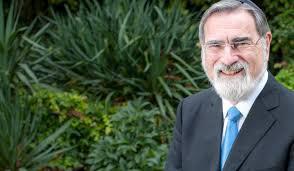
Covenant & Conversation
THOUGHTS ON THE WEEKLY PARSHA
Thoughts on the Weekly Parsha
RABBI LORD JONATHAN SACKS ZT"L
RABBI LORD JONATHAN SACKS ZT"L
FORMER CHIEF RABBI OF THE UNITED HEBREW CONGREGATIONS OF THE COMMONWEALTH
FORMER CHIEF RABBI OF THE UNITED HEBREW CONGREGATIONS OF THE COMMONWEALTH
May the learning of these Divrei Torah be
HaRav Ya'akov Zvi ben David Arieh zt"l
It was the emotional low of Moses’ life. After the drama at Sinai, the Revelation, the Golden Calf, the forgiveness, the building of the Tabernacle, and the book-length codes of purity and holiness, all the people can think about is food.
“Who will give us meat to eat! We remember the fish we ate in Egypt at no cost, the cucumbers, and the melons, and the leeks, and the onions, and the garlic! But now our throats are dry. There is nothing at all but this manna to look at.” (Num. 11:5-6)

It was enough to make anyone despair, even a Moses. But the words he speaks are shattering. He says to God:
“Why have You treated Your servant so badly? Why have I found so little favour in Your sight that You lay all the burden of this people upon me? Was it I who conceived all this people? Was it I who gave birth to them all, that You should say to me, ‘Carry them in your lap, as a nursemaid carries a baby’?… I cannot bear all this people alone; the burden is too heavy for me. If this is how You treat me, kill me now - if I have found favour in Your sight - and let me not see my own misery!” (Num. 11:11-15)
These words deserve the closest attention. Inevitably our attention focuses on the last remark, Moses’ wish to die. But actually this is not the most interesting part of his speech. Moses was not the only Jewish leader to pray to die. So did Elijah. So did Jeremiah. So did Jonah. Leadership is difficult; leadership of the Jewish people almost impossible. That is an old story and not an uplifting one.
The real interest lies elsewhere, when Moses says: “Why do you tell me to carry them in my arms, as a nurse carries an infant?” But God never used those words. He never remotely implied such a thing. God asked Moses to lead but He did not tell him
how to lead. He told Moses what to do, but He did not discuss his leadership style.
The man who gave Moses his first tutorial in leadership was his father-in-law Jethro, who warned him of the risk of the very burn-out he is now experiencing.
“What you are doing is not good. You will be worn away, and this people along with you. It is too heavy a burden for you. You cannot carry it alone” (Ex. 18:17-18)
He then told him to delegate and share his burden with a team of leaders, much as God is about to do in our Parsha.
Interestingly, Moses’ burnout occurs immediately after we read, at the end of the previous chapter, of Jethro’s departure. Something very similar happens later in Parshat Chukat (Num. 20). First we read of the death of Miriam. Then immediately there follows the scene at Merivah when the people ask for water and Moses loses his temper and strikes the rock, the act that costs him the chance to lead the people across the Jordan into the Promised Land. It seems that in their different ways, Jethro and Miriam were essential emotional supports for Moses. When they were there, he coped. When they were not, he lost his poise. Leaders need soulmates, people who lift their spirits and give them the strength to carry on. No-one can lead alone.
But to return to Moses’ speech to God, the Torah may be hinting here that the way Moses conceived the role of leader was itself part of the problem. “Did I conceive all these people? Did I give them birth? Why do You tell me to carry them in my arms, as a nurse carries an infant?” This is the language of the leader-as-parent, the “Great Man” theory of leadership.


Jerusalem Real Estate is My Business Eta: 054-723-3863
Amazing stand alone homes in OLD KATAMON, TALBIYA, BAKA, GERMAN COLONY
Stand alone home, newly built and ready to move in: GERMAN COLONY - over 450 sqm built, private parking, large outdoor areasinternal elevator. Please call for more information
In the heart of BAKA
4 rooms, 80 sqm with elevator, parking and storage. 2 small terraces. Asking 3,800,000 NIS
Exclusive BAKA. Mordechai Hayehudi. 107 sqm plus permit for 73 sqm & terrace. Sukkah terrace main floor. Elevator, pkg, storage. 6,800,000 NIS
SAN SIMON Ben Tabai 150 sqm. 9th floor. 3 bedrooms and 2.5 bathrooms. 2 elevators, underground parking & storage. completely accessible-turn key. Price 7,700,000 NIS
180 sqm Penthouse on an exclusive street in ARNONA
Fabulous views.
40 sqm balcony, registered parking.
Very high standard finish. Price: 9,200,000 NIS





Eta Morris Realty, Ltd. etamorrisrealestate@gmail.com
Eta: 054-723-3863 etamorrisrealty.co.il
Building on, and going beyond, the theories of Gustave le Bon and the “group mind,” Sigmund Freud argued that crowds become dangerous when a certain kind of leader comes to power.1 Such a leader, often highly charismatic, resolves the tensions within the group by seeming to promise solutions to all their problems. He is strong. He is persuasive. He is clear. He offers a simple analysis of why the people are suffering. He identifies enemies, focuses energies, and makes the people feel whole, complete, part of something great. “Leave it to me,” he seems to say. “All you have to do is follow and obey.”
Moses never was that kind of leader. He said of himself, “I am not a man of words.” He was not particularly close to the people. Aaron was. Perhaps Miriam was also. Caleb had the power to calm the people, at least temporarily. Moses had neither the gift nor the desire to sway crowds, resolve complexity, attract a mass following or win popularity. That was not the kind of leader the Israelites needed, which is why God chose Moses, not a man seeking power but one with a burning sense of justice and a passion for liberty.
Moses, though, seems to have felt that the leader must do it all: he must be the people’s father, mother, and nursemaid. He must be the doer, the problem-solver, omniscient and omni-competent. If something needs to be done it is for the leader – turning to God and 1. See Sigmund Freud, Totem and Taboo, and Moses and Monotheism, part III. See also Mark Edmundson, The Death of Sigmund Freud: the legacy of his last days (2007) who argues that this is why Freud spent the last year of his life writing the third part of Moses and Monotheism, as a warning of the danger of the craving for strong leadership.
asking for His help – to do it.
The trouble is that if the leader is a parent, then the followers remain children. They are totally dependent on him. They do not develop skills of their own. They do not acquire a sense of responsibility or the self-confidence that comes from exercising it. So when Moses is not there – he has been up the mountain for a long time and we do not know what has happened to him – the people panic and make a Golden Calf. Which is why God tells Moses to gather a team of seventy leaders to share the burden with him. Don’t even try to do it all yourself.
The “Great Man” theory of leadership haunts Jewish history like a recurring nightmare. In the days of Samuel the people believe all their problems will be solved if they appoint a king “like all the other nations.” In vain, Samuel warns them that this will only make their problems worse. Saul looks the part, handsome, upright, “a head taller than anyone else” (see I Sam. 9), but he lacks strength of character. David commits adultery. Solomon, blessed with wisdom, is seduced by his wives into folly. The kingdom splits. Only a few subsequent kings are equal to the moral and spiritual challenge of combining faith in God with a politics of realism and civic virtue.
During the Second Temple period, the success of the Maccabees was dramatic but short-lived. The Hasmonean kings themselves became Hellenised. The office of High Priest became politicised. No one could contain the growing rifts within the nation. Having defeated the Greeks, the nation fell to the Romans. Sixty years later Rabbi Akiva identified Bar Kochba as another “great man” in the mould of Judah
the Maccabee, and the result was the worst tragedy in Jewish history until the Holocaust. Judaism is about diffused responsibility, making each individual count, building cohesive teams on the basis of a shared vision, educating people to their full potential, and valuing honest argument and the dignity of dissent. That is the kind of culture the rabbis inculcated during the centuries of dispersion. It is how the pioneers built the land and state of Israel in modern times. It is the vision Moses articulated in the last month of his life in the book of Devarim.
This calls for leaders who inspire others with their vision, delegating, empowering, guiding, encouraging and making space. That is what God was hinting to Moses when He told him to take seventy elders and let them stand with him in the Tent of Meeting. Then:
“I will come down and speak with you there, and I will take some of the spirit that is on you and place it upon them.”
(Num. 11:17)
God was telling Moses that great leaders do not create followers; they create leaders. They share their inspiration. They give of their spirit to others. They do not see the people they lead as children who need a father-mother-nursemaid, but as adults who need to be educated to take individual and collective responsibility for their own future. People become what their leader gives them the space to become. When that space is large, they grow into greatness.
These weekly teachings from Rabbi Sacks zt”l are part of his ‘Covenant & Conversation’ series on the weekly Torah teaching. With thanks to the Schimmel Family for their generous sponsorship, dedicated in loving memory of Harry (Chaim) Schimmel. Visit www.RabbiSacks.org for more.







BY RABBI NACHMAN (NEIL) WINKLER FACULTY, OU ISRAEL CENTER
Although the origin of our tradition to read selections from the prophets each Shabbat is a matter of discussion among the scholars, all agree that it dates back to Mishnaic times. The most common explanation is that when the Jews were under the rule of Antiochus IV Epiphanes, they were forbidden to read from the Torah, so the sages instituted that a section of nevi’im that related to the parasha, be read instead. This ancient custom bestowed upon us the blessing of allowing common Jews to acquaint themselves with parts of Tanach that many would not otherwise have known.
Nonetheless, while the weekly reading might afford us a “taste” of the haftarah’s message, any deeper insight into the prophet’s words cannot be fully understood through one perusal. It is for this reason that it is necessary
Car owner
to investigate the previous or subsequent prophecies and, often, to uncover the time when they were delivered – something that can help us better understand WHAT the navi said WHY he said it. This is certainly true of our haftarah – one that is read twice each year but is rarely understood fully.


The prophet Zecharya (and his older contemporary, Chaggai), served at the beginning of the Second Temple era, a time when Jews had begun to return to Yerushalayim and rebuild the ruined Bet HaMikdash. The Jewish Community faced numerous trials including rebuilding the families who were lost during the Babylonian conquest, the financial necessity to build an economic base and the spiritual challenge to renew their relationship with G-d after the destruction of the Bet HaMikdash. It was this last challenge that the navi addressed. The people’s return to the homeland did not dispel their belief that Hashem has abandoned them and that their sins had made their return to Him… impossible. Simply put, the returning exiles had lost hope.
It was to these people that Zecharya brought his visions of hope. Even before the haftarah’s opening words, urging the community to rejoice at the news that
Hashem has returned to dwell amongst them, the navi promises an unprecedented expansion of Yerushalayim with the return of those remaining in the Diaspora (Zecharya 2: 8-11). The central vision shared by the prophet, the vision of the seven-branched candelabra, is the obvious connection both to our parasha (that begins with the Kohen’s daily task of kindling the Menorah) and to Chanuka. Additionally, the approach of the Ramban that sees the vision as one relating to the future kindling of the Kohanim in the time of the Maccabbees, leads us to believe that Hashem’s message to Zecharya might be directed to the navi’s own generation. Indeed, Rav Yissachar Ya’akovson calls for us to look at the third pasuk that follows the closing of the haftarah (v. 10) where Hashem makes it clear to the nation that His message to the prophet and to Zerubavel (who led the return to Jerusalem) should gladden them and cause them to rejoice because: “…shiv’a eleh einei Hashem…” the seven branches of the Menorah are (symbolic of) the eyes of G-d!!! – Heimah m’shotetim b’chol ha’aretz” –And they scan throughout the whole world!! The message going out to the new olim is clear: You believe that you have been abandoned? You believe that you can never return to G-d? Listen to the prophetic vision. HASHEM IS ALWAYS WITH YOU!!! …even when you think He is not!
What a powerful message to a struggling generation!
What a powerful message for all generations!!
Rabbi Winkler’s popular Jewish History lectures can be viewed by visiting the OU Israel Video archive: https://www.ouisrael.org/video-l ibrary




When American citizens pass away in Israel, IRS procedures can delay their beneficiaries from accessing US-based assets (real estate, bank accounts, stock, pensions, etc.)
The tax experts at MASAMERICA help families navigate these processes, working with financial institutions to release assets faster.
Unlike basic tax preparers, MASAMERICA’s US tax lawyers and CPAs have over a century of combined IRS experience. Let our expertise reduce your taxes and prevent future issues.
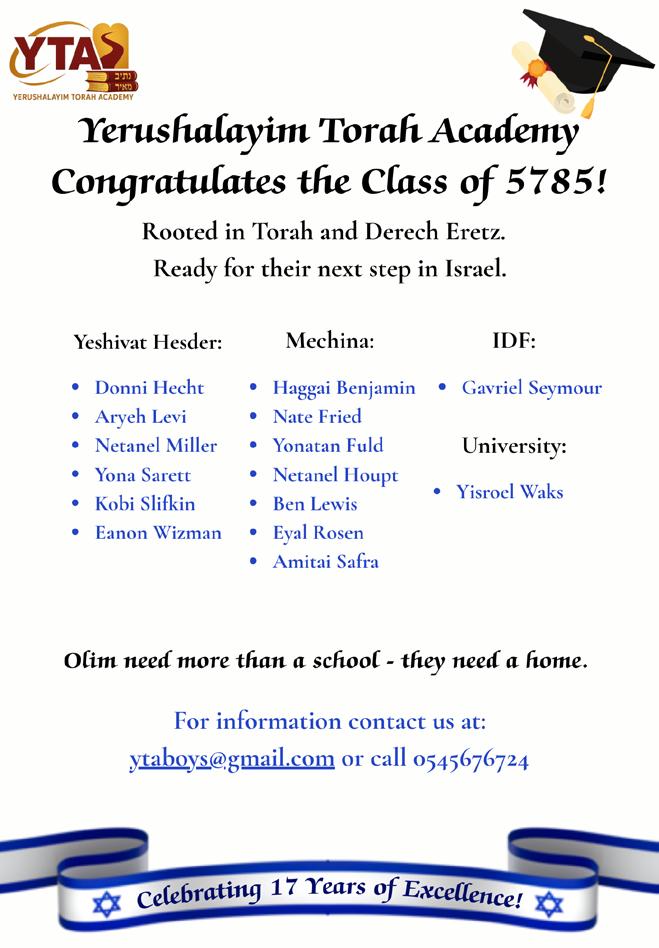



SHABBATTO scooter offers a "Mehudar" Zomet-approved Shabbat mechanism that operates according to the "Existing Current Modulation" principle. The Shabbat mechanism is pre-installed and does not require expensive fitting.




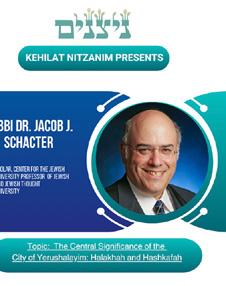
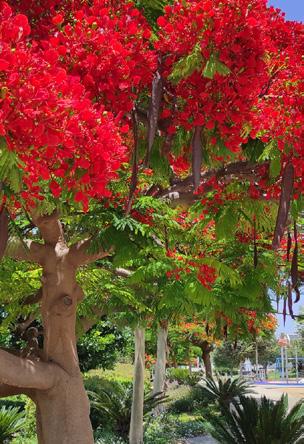
June is when the Flamboyant trees in Ashkelon start to bloom! Native to Madagascar, the first Flamboyant tree was planted in Sarona by the Templars. Today, there are thousands of them lining the streets of Ashkelon, making June an amazing time to visit so you can find your apartment. Call Stephen for a personal tour.


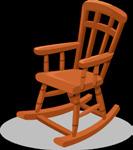

Rabbi Shalom
In this week’s parsha we encounter a very strange phenomenon. The parsha that we recite when we open the Aron appears – יהיו ןוראה עסנב – yet it is surrounded by two inverted letter nun's. This is the only time these upside down nun's appear in the Torah. Chazal tell us that they are there to separate the paragraph from what appears previously and afterwards, because it is actually in the wrong place. What? Who put it in the wrong place? God gave us the Torah, and this is how it appeared. How are we to understand this statement that a paragraph is in the wrong place? Where is it supposed to be positioned?
Rav Yosef Dov Solovetchik offers a very profound explanation. In fact, if you review the entire parsha it appears as if there are several unconnected occurrences grouped together. The Rav was able to find a common theme that also resolves the mystery literally surrounding the paragraph of ןוראה עסנב יהיו.


Last week we concluded the parsha with the building of the Mishkan and with the nesi'im offering their sacrifices. This week’s parsha opens with Aharon's task in the Mishkan – lighting the Menorah. It is followed by the directive to the levi'im regarding their service in the Mishkan. Now we are informed of the date – it happens to be the first year anniversary of the exodus, the 14th of Nisan and the korban pesach is brought, along with the laws of pesach sheni for those who were impure. Everything in chronological order.
Then we return to the laws of the Mishkan. Now that the Mishkan is complete we need to know the manner in which we are to progress to Israel. We are instructed that when the cloud rests we stay put, when the cloud moves forward we follow.
We are then given the laws of the trumpets תורצוצח – so that we understand different signals – when to gather

Then we encounter the paragraph of ןוראה עסנב יהיו and the inverted nun's. Why does it appear here? We are about to complete our journey from Egypt to Israel. Next week is when the spies transgress and we are destined to wander in the desert for 40 years. But right now – we are set to enter Israel in a few weeks! As we begin our travels we are told that the Aron will help us defeat our enemy. So far it seems like everything is in fact in the correct place.
BUT- then the people sin. They complain about the food – they want meat – Moshe realizes that the people are not ready to be independent, fight a war and build a country. They have a slave mentality. They are doomed. They are not ready to enter Israel. As the Rav says- this is one of the most tragic moments of Jewish history.
Moshe then realizes he needs help leading the nation and is given 70 elders to assist him. Two of the elders prophesize that Moshe will not enter Israel, which essentially leads Aharon and Miriam to question why he is different from others






and separates from his wife.
After understanding the thread that weaves all of these seemingly distinct parshiyot together, we recognize that everything is in chronological order! What tragically unfolds is that the chapter of ןוראה עסנב יהיו is in the right place . It is a continuation of the preparation for our journey, battle and entrance into the land of Israel. Unfortunately, our behavior changed the course of history and delayed our journey by 40 years, de facto making ןוראה עסנב יהיו seem as if it is out of context. יהיו ןוראה עסנב became "misplaced" because of our lack of faith and appreciation in God.
May we strengthen our Emunah and Bitachon so that we merit to complete our journey as planned and be granted a geula shelema bimhera b’yamenu!
Faculty, OU Israel Center
“Vayis’u mei’har Hashem – They journeyed from the Mountain of Hashem. ” (Bamidbar 10:33) Three words that sound simple yet carry so much meaning and implication. Chazal lists this as one of the three troublesome events that occurred after Am Yisrael left Har Sinai (the other two are listed as the “mit’onenim” – those who sought a pretext to complain, and the people’s unjustified plea for meat). One can wonder, what was the trouble here? The people only traveled following Hashem’s directive given through the movement of the clouds. Yet, Ramban notes that it was this sin that perhaps prevented the Jewish people from entering the Land of Israel immediately. What indeed happened?
The Gemara (Shabbat 116a) relates that when Am Yisrael left Har Sinai, “saru mei’acharei Hashem – they turned from after Hashem” and hurriedly left Har Sinai. Tosafot expounds, “like a child running out

of school.” It seems they were afraid that if they stayed any longer at Har Sinai they would receive additional mitzvot. Rav Yerucham Levovitz zt”l notes that this Midrash cannot be understood superficially. The generation that left Egypt was considered the most exalted generation who witnessed the ultimate revelation! Clearly, they did not ‘run away’ from the mountain to shirk responsibility. Rather, they were held accountable for leaving Har Sinai with an extra bit of enthusiasm, a spring in their step, so to speak. Hashem, who discerns man’s inner thoughts, understood their underlying attitude.
Rav Itzele Petersberger teaches that we can easily apply this narrative to ourselves. When one finishes learning with a chavruta, or studying Torah on one’s own, he must be careful to close his sefer slowly, to express a longing and anticipation for the next time he will have the opportunity to learn. Savoring the experience, not”running away” from one’s learning, indicates a love and deep desire to connect to Torah.
Similarly, Rav Simcha Zisel Broide in Sam Derech, explains that Am Yisrael should have felt some spiritual connection to Har Sinai, after having encamped there for over a year. Lingering a bit before leaving would have indicated some affinity with the area. The fact that this was totally absent, and they were able to move forward without even a backwards glance is in itself a great calamity.
Rav Eliyahu Roth zt”l in Sichat Eliyahu sees this event as a metaphor for how we ought to integrate Torah into our everyday life. As long as the Jewish people were close to Har Sinai, they felt able to hold on to the intellectual veracity of Torah. As soon as they “journeyed from the mountain,” they realized the challenge of maintaining the great spiritual height they experienced.
Parashat Beha’alotecha always follows shortly after the chag of Shavuot, when we find ourselves at a pivotal point. Intellectually, we believe in the centrality of Torah and tried to genuinely feel kabalat haTorah, perhaps even making new commitments to uphold its truths. Now, two weeks after the chag, can we concretize these promises, can we sustain our adherence to live with Torah integrity? Let us not run away, rather, lean into Torah living with faith and enthusiasm.




JERUSALEM
Brand new
120 SQM
15.9 SQM balconies
3 Bedrooms
Har HaBayit and Old City views
9.85M / $2.82M
MISHKAFAYIM
Ramat Beit
Shemesh Alef
Luxury apt
Rare property!
Over 250 SQM on one level
Price on Request







Bar-Ilan University International School invites you to take the next step in your academic journey!
We offer Undergraduate, Graduate, PhD, and Postdoctoral programs in English and bilingual tracks (English & Hebrew).
Join a diverse, dynamic learning environment at one of Israel’s leading universities.
Apply today and shape your future with Bar-Ilan!

Impacting tomorrow, today.



Executive Director, Camp HASC
Author of Baderech: Along the Path of Teshuva (Mosaica 2021)
Mischel EXECUTIVE DIRECTOR, CAMP HASC AUTHOR OF BADERECH SERIES
Reb Shlomo Halberstam, the Bobover Rebbe, zy’a, of the post-Holocaust era, revived his community with his resilience and faith. The Rebbe restored kavod, dignity, to thousands of survivors and helped them rebuild their lives, expressed the paradigm of fatherly love, chein v’chesed, grace and righteousness.
Family weddings in Bobov were majestic; thousands joined the Rebbe to share in the celebration, dancing into the wee hours of the morning. For all the survivors, their families and the community, s’machos uplifted them with a sense of victory, affirmation, continuity, faith and celebration. All felt certain that Netzach Yisrael lo yishaker, ‘The promise of the eternality of Klal Yisrael is true.’
At the height of the dancing and fervor,
the Rebbe took a breather while standing at his shtender. Scanning the thousands of revelers, he caught sight of an elderly chasid dancing, his arms on the shoulders of a taller chasid in front of him in the circle. The Rebbe called over a young man who was nearby and whispered to him, “Ti mir a toiveh, please do me a favor: go stand between that elderly Yid and the tall fellow in front of him, so that the zakein need not exert himself and have to reach uncomfortably during the rikud.”
Amid rejoicing and d’veikus, the Rebbe not only perceived the vulnerability and possible discomfort of another person, his mind computed and communicated a solution. At the height of his spiritual bliss, the Rebbe remained aware of the seemingly minor need of another.
5 4 - 9 4 4 - 6 7 7 8

“Aharon did so; he lit the lamps toward the face of the menorah, as Hashem had commanded Moshe.” (8:3)
Rashi tells us that the phrase “Aharon did so” praises the consistent and passionate avodah of Aharon HaKohein in the way by which he lit the Menorah: לש
, “This is to tell the praises of Aharon: he did not change.” Day in and day out, Aharon HaKohen’s service of Hashem was unwavering; it did not change in the sense that it was constantly new, exciting and filled with chiyus, vitality.
The tzadik Rebbe Meir of Premishlan shared an expansive interpretation of Aharon HaKohein’s service, and offered a beautiful p’shat in explaining this praise. Aharon haKohen was unique in the trait of oheiv shalom, rodef shalom, a lover of peace between people, and a pursuer of peace. His days and nights were spent stretching himself to bring people together, helping them work through a falling out or resolve a machlokes.
The great shevach or praise of Aharon is that even while in a deep meditative state of d’veikus while lighting the Menorah in the Mishkan, he remained completely open and sensitive to the people around him. He is praised for maintaining his character and his avodah of reaching out to people. His concern and attunement to the needs of those around him did not change, even in intensely introspective moments standing before Hashem in the Beis HaMikdash. Lo shinah, he didn't change in this flexibility of being.
When we bring to mind a ‘holy moment’ or envision a ‘spiritual person’ or a Kohen Gadol, we might think of someone with their eyes closed, ‘vertically’ focussed, reaching beyond this world. A ‘mundane moment’ or ‘people-person’, by contrast,

might seem to be characterized by a horizontal focus, reaching out to the world. These two modes of being seem to be mutually exclusive. However, a person can be completely given over to their inner world, and simultaneously aware of the minutiae of the outer world and the needs of people. It is davka Aharon HaKohen who is chosen to light the Menorah. Big people, truly holy people, even amid their biggest moments, notice ‘little things’. May we learn from this and apply it to our lives as well, on our level. May our service of Hashem and fulfillment of mitzvos be one of passionate devotion, intensity and focus, and yet may we remain ever aware of the needs and wellbeing of those around us, and ever-willing to stretch out our hand to them.



simchat shmuel
BY RABBI SAM SHOR DIRECTOR, TORAH INITIATIVES, OU ISRAEL
BY RABBI SAM SHOR Program Director, OU Israel Center
Our Sedra this week of course is Parshat Beha’alotcha. Hashem instructs Moshe to speak to his brother Aharon, and tell him Behaalotcha et haNeirot.
Rashi offers three possible interpretations to the meaning of these wordsbehaalotcha et HaNeirot. The second interpretation suggested by Rashi- that you cause the flame to be elevated,to rise above the oil which was kindled. By kindling the oil, Aharon will cause lights to rise up and shine in the Beit HaMikdash.
Rabbi Moshe Wolfson, zy'a, suggests that this idea introduced by Rashi, actually serves as a pedagogical message for parents and educators. Shlomo HaMelech, in Mishlei wrote: Ner Hashem Nishmat Adamthe Candle of G-d is the soul of man. Each human being is a proverbial divine candle. Innate within each human being, explains Rabbi Wolfson, is the potential to bring great light into the world. The kindling of the Menora, which Aharon is instructed to perform, is thus a symbol for the goals


of how we as parents and educators are meant to encourage our children in matters of chinuch.
Chinuch, true education is much more than simply sharing information, or mastering textual knowledge. Proper chinuch explains Rabbi Wolfson, kindles that innate spark within the hearts and minds of our children and students, and enables their unique lights to rise up, develop and shine brightly!
Similarly, Rav Shamshon Raphael Hirsch zt'l explained that the very word for education- chinuch is related to the word chein- which means inner beauty, grace or potential.True chinuch empowers students to find those innate talents,develop confidence and self-esteem and truly shine!
In addition to Moshe's instruction to Aharon to kindle those lights, and the beautiful interpretations offered by Rav Wolfson and Rav Hirsch, Parshat Beha’alotcha, also once again emphasizes the greatness of Moshe Rabbeinu, most specifically Moshe's great humility. The pasuk tells us:




V'ha'ish Moshe anav meod, mikol adam asher al pnei ha'adama....And Moshe the person, was exceedingly humble, more so than any other person on the face of the Earth...
The Ibn Ezra interprets our pasuk to connote that what made Moshe truly uniquely humble is that Moshe never sought superiority over any person, nor did he ever pride himself at all about his leadership position.
Rashi defines for us the true nature of Moshe's humility, commenting on the word anav with two powerful words-shefel v'savlan - shefel - literally low or lacking any ego or haughtiness and savlan- patient. Moshe's refined humility is not only his ability to not take himself too seriously, but his capacity to be extremely calm and patient in his relationship to others.
Far too many of us have a fundamental misunderstanding of what it means to be truly humble. Rav Kook zy'a in his important work on character development, Midot Rayah, addresses this fundamental misinterpretation of what true anivut really is.
Kol zman sheha'anava mevia atzvon, hee pesula- anytime that humility brings with it sadness or depression it is invalid.
greatness of Moshe Rabbeinu does not mean to be self -deprecating, or to humble ourselves to the point of sadness and despair, rather to be level-headed, calm and patient with ourselves, and with one another.
The Chovot Halevavot, offers a further insight , which can help us to better understand what it really means to be an anav:
"Real humility involves recognizing one's limitations, actualizing our divinely given strengths and talents, and viewing all personal achievements as gifts from Hashem."
Yehi Ratzon, may each of us be blessed to take to heart and truly heed these powerful teachings and strive to emulate the example set by our greatest teacher zy'a- V'ha'ish Moshe anav meod mikol adam asher al pnei ha'adama.












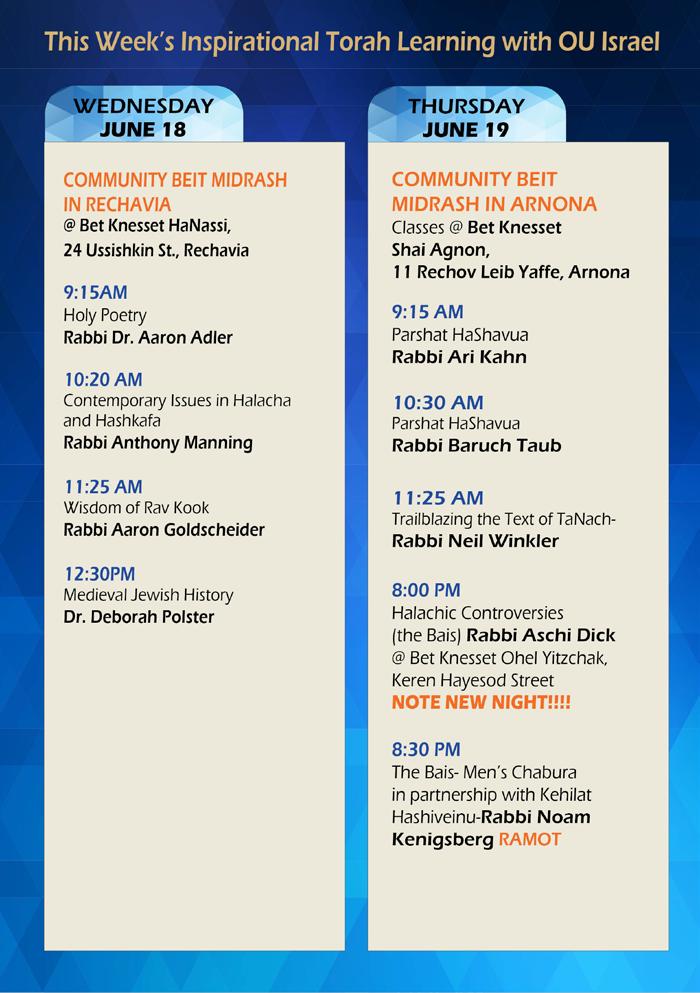
OU Israel extends thanks to our GENEROUS SPONSORS who helped make our annual SHAVUOT NIGHT LEARNING in partnership with Beit Knesset HaNassi a wonderful success!
SHAVUOT NIGHT LEARNING was once again generously sponsored by Rabbi Nachman & Rebbetzin Faiga Kahana
RABBI WEIN’S SHIUR was dedicated by Marty & Miriam Knecht in honor of their Rav, HaRav Berel Wein shlita and in tribute to their former Rav, HaRav Elazar Mayer Teitz zt’l
RABBI WEINREB’S SHIUR was dedicated by the Ettinger and Rubin families in memory of
RABBI WEINREB’S SHIUR was also dedicated by Avraham & Shaindy Kelman in memory of their parents Yussi & Frida David and Jerome & Bernice Kelman z"l, and in honor of our brave soldiers
RABBI SHOR’S SHIUR was dedicated by Reuven & Meira Pittenger in honor of Leah, Hannah, Emuna and Aliza that they continue to honor Hashem and be a source of nachat to their parents as they grow and learn
RABBI GOLDSCHEIDER’S SHIUR was anonymously dedicated in the merit for the Neshamot who perished Al Kiddush HaShem, for the safe and speedy return of our hostages, captives, for the healing of the wounded, and for the protection of all those fighting and for our victory over our enemies.



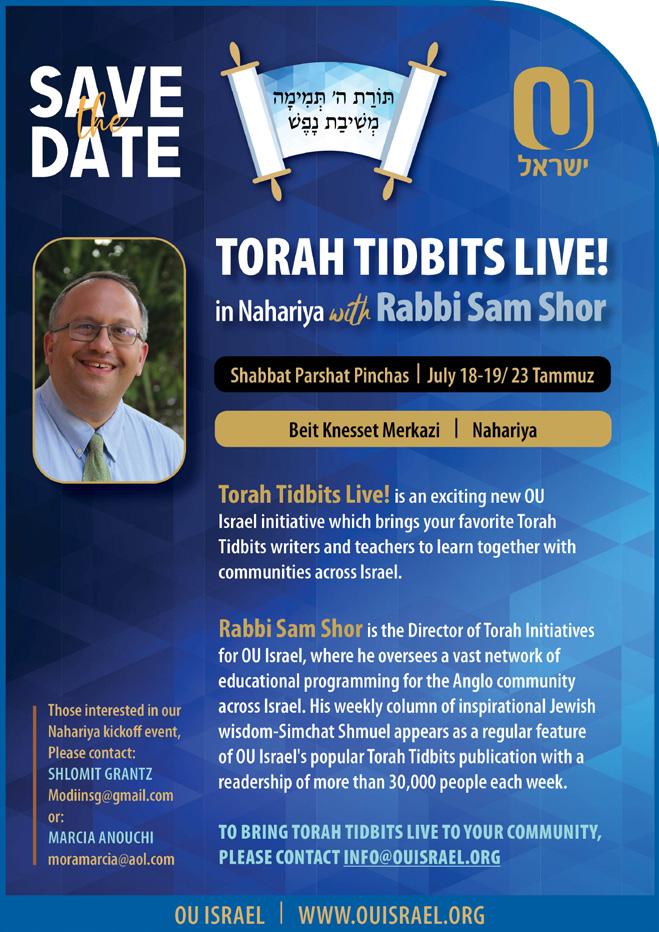


“Turning Despair into Hope”
www.yeshezra.org
Director: Menachem Persoff

Thanks to all the generous donors who helped a young lady from a poor home celebrate her Bat Mitzvah
Website: www.yeshezra.org
Bank Transfer: Mercantile (17), Branch 642, A/C 79747843
Send Asmachta for receipt
Checks: “Yesh Ezra,” POB 31476, Romema, Jerusalem
Credit Card:
Sara – 077-820-0196 / 058-530-9161
Sun-Wed (10:00am-14.30 pm)
Donate with:

Tax benefit for donations as per section 46a of the Israeli tax code NACHI
Inquiries: Menachem Persoff
050-570-1067 | menpmp@gmail.com
New building starting constuction in Baka 3 and 4 room apartments, starting at 4m shekel, small 4.5 story building, Sukka porch with every unit. Brand New Building in Mekor Chaim
Recently finished, 4 room 111m, mirpeset, storage, parking, Shabbat Elevator, 3rd floor. 4.37m shekel
Great opportunity to buy in a new building starting construction in Arnona close to Baka. Great prices and the price isn't linked to inflation! Starting at 2.55m shekel
Shabbat afternoon
Parshat HaShavua shiur given by Rabbi Aaron Goldscheider at Beit Knesset Ohel Yitzchak, Rechov Washington 12 at 5:30 pm


RABBI
MOSHE TARAGIN
RAM YESHIVAT HAR ETZION
MAGGID SHIUR ALL PARSHA AND ALL DAF, OU.ORG
Everything was poised for history. We stood at the doorstep of the Land of Israel, on the brink of redemption. Just three days separated us from entering the Land, establishing Jewish sovereignty, appointing a Jewish king, and inaugurating the kingdom of Hashem. But tragically we unraveled. Through a cascade of missteps, fears, and national breakdowns, we shattered the historical arc and derailed the redemptive journey. What should have been a three-day journey to history became a 40-year detour, a devastating delay of our destiny. We grumbled about our conditions, hungered for meat, and sank into false nostalgia for the imagined luxuries of Egypt. Then, in a final, devastating blow, Aharon and Miriam’s subtle undermining of Moshe Rabbeinu escalated into a national slandering of the Promised



Land, bringing our journey to Israel to a halt. Amidst the tide of these unfortunate mishaps, the Torah inserts a brief but fascinating interlude about two renegade prophets—Eldad and Meidad. From among seventy-two worthy candidates selected for the first Sanhedrin, only seventy could be chosen. Eldad and Meidad were left out—yet despite their exclusion, they continued to prophesy independently, without formal license. Yehoshua, alarmed by their unregulated prophecy, urges Moshe to intervene and silence them. But Moshe restrains him, offering a hope that “םיאיבנ
Would that all of God’s people were prophets. Moshe does not rebut or dismiss Yehoshua’s plea. Instead, he longs for a broader vision. What underlies Moshe’s response, and how does it address Yehoshua’s rightful concerns?
First and foremost, Moshe’s response reveals a depth of humility that shines through even in the face of direct challenge. Eldad and Meidad’s unauthorized prophecy strikes at the heart of Moshe’s authority, yet he responds with restraint. Moshe was entrusted by Hashem to appoint the seventy elders of the Sanhedrin; by
persisting in prophecy after their exclusion, Eldad and Meidad openly defy Moshe’s leadership and undermine his authority. But their actions may have gone even further. The Gemara in Sanhedrin (17a) cites an opinion that their prophecy wasn’t merely a subtle slight of Moshe’s authority. It was a bold proclamation that Moshe would not lead the people into Eretz Yisrael, and that Yehoshua would take his place. Although Moshe’s “sin” of striking the rock had not yet occurred, Eldad and Meidad foresaw that outcome. Their grainy, distant vision already hinted at the future. By publicly voicing Moshe’s eventual downfall, they chipped away at his standing in the eyes of the people. Moshe’s measured response and remarkable self-restraint reveal the depths of his humility. It was never about him. That truth was evident from the very beginning—at the s’neh— where he pleaded with Hashem to assign the mission of yetziat Mitzrayim to someone else. From the outset, Moshe resisted the spotlight. Later, when Hashem commands him to share his prophetic spirit with seventy elders, Moshe again steps back willingly. Without hesitation or reservation, he spreads the gift entrusted to him, embracing a vision beyond personal acclaim. Even when two renegade prophets openly challenge his authority, bypassing the established order and proclaiming a vision that struck him deeply and personally, Moshe remains steadfast in restraint, refusing to retaliate. Instead, he utters one of the most generous lines ever spoken by a leader: םע לכֵּו ןתי ימ" “םיאיבנ 'ה - Would that all of God’s people were prophets. Moshe’s greatness lies in his ability to share—his Torah and his nevu’ah.
An intriguing Gemara in Nedarim (38a)

In the heart of calm and pastoral BAKAPrivate arab house, 6 rooms, 500m + possibility of building 250m, huge garden, approx. 700m, completely renovated, underfloor heating + a/c, large parking, 5 bathrooms, 5 toilets, green
BAKA - Pastoral, garden apartment, private entrance, 100m, (70 taboo) 4.5 rooms
4.490.000NIS MICHAEL 052-3202488
MENDEL 0528980111
CITY CENTER - 2 rooms, Savyon view, luxurious, furnished, Shabbat elevator, concierge.
2.890.000NIS MENDEL 052-8980111
BAKA - New penthouse, 4 rooms in a small luxurious building with character, alone upstairs, 3rd floor + elevator, 4 orientations, 3 toilets, 2 bathrooms, terrace / sukkah, 70m, parking, store-room
BAKA - 2 apartments sit ontop of each other, 5/3 rooms + studio, separate entrance, balconies
5450000 NIS MENDEL 052-8980111
9.800.000 NIS MICHAEL 052-3202488
MEKOR CHAIM - Beginning of the street, spacious 4 rooms, Succah porch, parking, storeroom
4.850.000 NIS MICHAEL 052-3202488
MOSHAVA / In a building after TAMA 38, new apartment, 4 rooms, 3rd floor + elevator, balcony/partial sukah, opened sight, 2 bathrooms, calm, parking
MENDEL 052-8980111
GERMAN COLONY - Garden apartment, 110m + 370m garden, storeroom, parking
8.500.000 NIS MENDEL 052-8980111
BAKA / MEKOR HAIM - 4 rooms, 90m, 2nd floor + elevator, completely renovated, fireplace, a/c, gas heating, very central, close to all amenities
MENDEL 052-8980111
praises Moshe for choosing to share Torah sheba’al peh with Am Yisrael. The Gemara implies that Moshe could have reserved the oral tradition as his own private domain of knowledge. But Moshe shares. He opens the gates wide. He disperses wisdom and sanctity rather than hoarding it. His sharing is his humility. He does not seek to centralize power around his personality. On the contrary, he diffuses it. He wants a nation of prophets, not a cult of one.
Near Arnona Hatzaira, in a step building, very large 5-room apartment + balcony/sukkah, 40m, renovated, 3rd floor, private entrance, quiet, potential for extra independent unit
MICHAEL 052-3202488
ARNONA – 3 rooms, that will be transformed to 90m, 3rd floor with elevator, store-room, parking
ONLY 2550000 NIS
MICHAEL 052-3202488
In the pastoral BAKA - quiet and central, stunning villa 350m, in a magical atmosphere, designed, pool, 4 bedrooms, cinema room and more, 4 bathrooms, garden, parking
Moshe’s intriguing response to Yehoshua reveals more than his extreme humility. His exchange with Yehoshua reflects a subtle yet profound tension between two spiritual approaches. Yehoshua, fiercely loyal, calls for the silencing of the renegade prophets who
MIKAEL 052-3202488
ARNONA HATZEIRA - Very spacious penthouse, 120m, 4th floor + elevator, huge terrace / succah, 75m, open view, 2 parking spaces, cellar, 3 toilets, quiet, completely renovated, immediate entrance
MICHAEL 052- 3202488
threaten Moshe’s authority. Moshe responds not with rejection, but with a dream: 'ה םע לכֵּ ןתי ימו ?יל התא אנקמה" “םיאיבנ - Are you zealous for me? Would that all of God’s people were prophets. Moshe’s open-ended, almost rhetorical response suggests that Yehoshua’s concern carries weight and merit, but that this is not a simple matter to be addressed with a one-dimensional reaction. His answer leaves space for nuance and complexity, acknowledging that competing values are at play.
Moshe’s open-ended response, which acknowledges the complexity of the issue, echoes another delicate exchange that ends with a similarly unresolved open-ended question. In Parshat Vayishlach, after the military action against the people of Shechem, Yaakov voices concern to his sons that their retaliation might jeopardize relations with neighboring tribes. The shevatim do not directly contradict him; instead, they pose a sharp rhetorical question:הנוזכֵּה" “?ונתוחא תא השעי - Shall our sister be desecrated? Their rhetorical question leaves the matter open, suggesting that while Yaakov’s fears are valid, so too is the imperative to defend family honor and moral purity. This open-ended reply reflects a situation of competing truths: Yaakov’s concerns hold weight but are outweighed by the need to protect family integrity and honor. So too with Moshe. His response does not negate Yehoshua’s instincts but hints at a broader vision—one that appreciates Yehoshua’s concerns while also embracing the dream of a spiritually awakened nation. Eldad and Meidad are sincere and deeply devoted to prophecy. They hoped to join
the first Sanhedrin but, when excluded, they didn’t give up their spiritual quest and continued to prophesy. Yehoshua’s concern is valid. At this delicate time, as Moshe’s authority expands into a new structure, self-appointment to be a prophet risks undermining that authority. Their actions, though heartfelt, threaten order and discipline. Yehoshua’s point is strong and must be taken seriously. Moshe answers not with denial but with a longing for a different state of affairs. He agrees that Eldad and Meidad’s behavior is misguided and potentially harmful. Yet he wonders aloud—is this truly the greatest problem? Is the main issue plaguing Am Yisrael that religious passion is being expressed imperfectly? The nation was in the throes of a spiritual crisis—grumbling, unchecked desires, and deep ingratitude. Against that backdrop, concerns over the precise boundaries of prophecy feel secondary. The greater danger wasn’t Eldad and Meidad’s unregulated inspiration—it was the absence of any genuine religious fire. A hollow spiritual void had taken hold, giving way to complaints, discontent, and a craving for meaningless indulgences. Moshe’s open-ended response puts everything into perspective. Yes, Eldad and Meidad’s actions might have been irregular, even risky—but they weren’t the real threat. In fact, in a different time and setting, their passion would represent the ideal. The dream isn’t to silence that fire—it’s to build people who can carry it properly. A midrash suggests that Moshe wasn’t just abstractly endorsing a nation of prophets but was envisioning an actual future where prophecy would be more widespread. This future is detailed by the navi Yoel (perek 3),
who describes a time when divine spirit will rest on all:
For Moshe, the democratization of prophecy is no disaster—it is spiritual utopia. While in the present moment it is risky and disorderly, it is not inherently flawed, nor is it the greatest challenge for a nation still lost in grumbling and ingratitude. For this reason, Moshe does not reject Yehoshua’s claim outright, nor issue a firm decree. Instead, he leaves it open-ended—as a question and a wish. Yehoshua is correct: their behavior is unauthorized and potentially dangerous. Yet their religious passion holds great merit, and in another context, shared prophecy would represent the ideal. Moshe restores perspective.
Moshe’s open-ended hope echoes a similar one expressed by Hashem at Har Sinai. We were too overwhelmed by the voice of Hashem to receive the entire Torah directly. Instead, we begged Moshe to mediate, sparing us a direct encounter with Hashem. This was unfortunate, for had we heard the whole Torah directly, we may have valued it more and betrayed it less. Moshe felt this disappointment deeply. Yet Hashem reminded him: םימיה
Though in that moment this extreme awe compromised Matan Torah, in the long run, intense yirat Shamayim strengthens religious observance and piety. The phrase ןתי ימ - first spoken by Hashem at Har Sinai - captures this complex situation: certain traits, though ideal in principle, may falter in practice when
misaligned with context. Extreme yirat Shamayim is a noble aspiration, yet in that moment, it limited the experience of Sinai. Moshe echoes that exact phrase in Beha’alotecha. Instead of rebuke, he offers vision and perspective. Religious passion—even when misdirected—is a treasure, not a threat. In the current fragile state of the nation, it was not the proper manner of expression. In his nuanced and deliberately allusive response, Moshe urges Yehoshua to lift his gaze and to see the broader horizon rather than fixating on the immediate disruption. We are often quick to judge how others express their religious passion. When their expression feels misaligned, we instinctively offer alternatives that we believe strike a more thoughtful harmony between competing religious values. That instinct is valid; it’s important to assess whether spiritual energy is being channeled constructively. Inner religious harmony is often elusive. We all encounter forms of religious expression that feel off-kilter or lacking in proper balance and steadiness. But sometimes we lose perspective. A greater threat than misguided religious passion is spiritual emptiness—apathy, dryness, and disengagement. In the larger picture, the more urgent challenge is sparking religious vitality where none exists. When passion is present, even if it’s misdirected, we’re already partway there. Moshe’s measured response reminds us to keep that proportion clear.

Rabbi Taragin’s newest sefer entitled “To be Holy but Human: Reflections upon my Rebbe, Rav Yehuda Amital (Kodesh) is now available at: mtaraginbooks.com and in bookstores

In the Haftorah of Behaalotcha, the prophet Zechariah offers a vision of hope to a nation in the midst of rebuilding. He sees a “great mountain” standing before Zerubbavel, leader of the returning exiles — a symbol of the overwhelming challenges ahead. But the mountain will flatten, and Zerubbavel will lay the final stone of the new Beit HaMikdash to the shouts of הל ןח ןח - Grace, grace to it!
It’s a surprising choice of words. Why not קזח ,קזח - strength or דובכֵּ ,דובכֵּ - glory? Why ןח?
Rashi, commenting on Megillat Esther (2:15), explains that Esther possessed chein, a quality which causes someone to be universally beloved — each person sees them as one of their own. It’s a grace that draws connection without needing justification. Rav Samson Raphael Hirsch, in his commentary
BY REBBETZIN DR. ADINA SHMIDMAN
DIRECTOR, OU WOMEN’S INITIATIVE

on Bereishit 6:8, where Noach is described as finding chein in the eyes of Hashem, writes that chein is not earned through reason or merit, but arises from an inner charm — a quiet spiritual radiance that awakens goodwill without force.
Zerubbavel’s Mikdash was simpler than the one built by Shlomo, but it carried something deeper: perseverance, humility, hope. The cry of הל ןח ןח wasn’t about outward grandeur. The deep hope was that the act of rebuilding be seen with favor, that its inner beauty be recognized.
We all know people who are rebuilding — their lives, their faith, their strength. Like in Zechariah’s vision, we have the power to help flatten the mountains before them — not always through solutions, but through chein: choosing to see their effort with empathy and grace - to honor their journey, and to speak words that uplift.
Let us be the voice that says:
“הל ןח ןח“ — I see what you’re building. And I bless it with grace and grace.



August fully booked! Availability in July for the perfect family getaway in the Lower Galilee!
Well appointed kosher home with indoor/outdoor kitchens
15m pool, gorgeous grounds
Space for 40 people




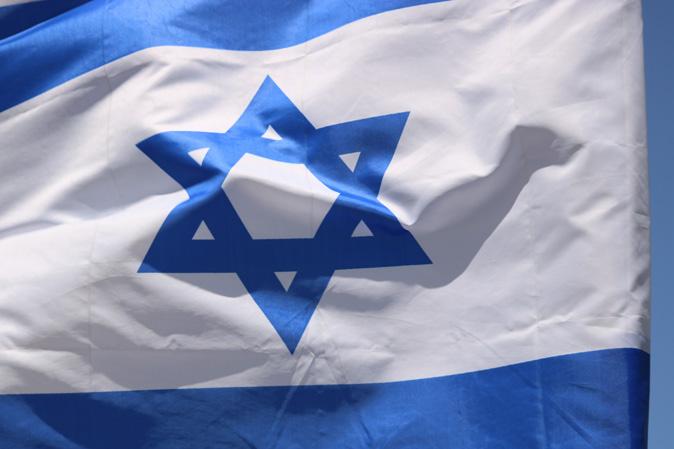



Lizzy










AARON
EDITOR, TORAH TIDBITS RAV,
JERUSALEM SHUL BAKA, JERUSALEM
When Rav Reuven Margoliot zt”l, an eminent talmid chacham of the past century, asked Rav Aryeh Levin zt”l: “What made Rav Kook so great?’” Rav Aryeh replied, “I am not one who knows how to estimate his greatness, but I can only say this: I have never seen any katnut (smallness) in him.” (Likutei HaRaya Vol. 1, ppp. 17-24)
The above anecdote reflects the remarkable piety of Rav Kook. Rav Aryeh Levin, one of Rav Kook’s closest disciples and friends, attested to his master's flawless character.
A second story spotlighting Rav Kook’s exceptional midot has been passed down from another one of his illustrious


students, Rav Yitzchak Hutner zt”l. Rav Hutner once conversed with the famed “Saba of Solobodka,” Rav Nosson Zvi Finkel who was a key figure in the Mussar Movement, about the exceptional qualities of Rav Kook. Rav Finkel described Rav Kook in the following way: “Rav Kook may not have studied or been trained by any of the Mussar Yeshivot, but he is the embodiment of Mussar.” (Otzrot HaRaya #7, Tzuriel, p. 511).
Rav Kook was surely inspired by the unique path of Rav Yisrael Salanter who emphasized the importance of refining one’s character and continually working to improve one’s midot. Rav Kook, in contrast to Rav Salanter, emphasized a modality of Mussar which focused on teachings and insights that are more joyful and which build up a person’s self-confidence.
Rav Kook recommended the study of Mussar for the scholars and laymen alike. This message is clearly seen in a letter he penned to his famed father-in-law, the Aderet, Rabbi Elijah David Rabonowitz-Teomim
(1843-1905). In 1905, only a short time after Rav Kook’s arrival in Israel, he wrote: “For various reasons, this area (i.e. Mussar) has not been dealt with publicly for many years and has been sequestered in the hearts of the great scholars of Israel. Very little of this topic has been explained clearly in a way that this generation can comprehend…” (Mussar Avicha, Gerstein, p. 195)
Rav Kook made the point that the Mussar approach of the past generations had emphasized yirat Hashem (fear of God), which often results in a person feeling a “lowly level of fear of punishment.” This is far from ideal because it “involves timidity, sadness, and the like, which suppress the body and soul” (Ibid. p. 197). Rav Kook preferred a Mussar approach characterized by yirat haromemut (awe of Hashem) which emphasizes assertiveness and boldness in one’s yearning for Hashem and spiritual growth. Rav Kook believed deeply in the immense potential in every Jewish soul. (Ibid. 198).
Rav Kook commented on a passage in the Talmud which offers advice on overcoming the yetzer hara:“ Rabbi Shimon ben Lakish said: One should always incite his good inclination against the evil inclination.” (Berachot 5a)
Rav Kook was quick to point out that Resh Lakish did not teach that the yetzer hara be vanquished or conquered. Rather, one is to “stir up,” “enliven,” the yetzer hatov to take control over, or harness the yetzer hara. Character traits that we often think of as negative traits can, and must, be employed in a positive way. Even hatred, passionate desires, and jealousy have their place. Rav Kook recommends we get to work on crafting every mida to be used in a positive manner.


Resh Lakish continues in this talmudic passage to offer precise tactics which one can implement when the yetzer hara is gaining the upper hand.
“First, engage in the study of Torah. If this is not effective, recite the Shema. When these acts do not weaken the yetzer hara’s assault then one should contemplate the day of death. “ (Ibid.)
Rav Kook offered an insightful comment regarding each step in the process: One should study particular areas of Torah, such as Mussar, which will help one strengthen one’s resolve and bolster one’s good traits. Torah study focuses on our intellectual understanding, whereas reciting the Shema is geared toward providing an emotional boost. Therefore, says Rav Kook, the study of Torah combined with reciting Shema will give the person the enhanced resolve to redirect and
transform the yetzer hara, negative inclinations into a positive force.
Only as a last resort should one turn to picturing in one’s mind the day of death. Such thoughts may be effective for the moment in vanquishing the yetzer hara, but such contemplations also have a negative influence and bring on gloom and despair. Somber thoughts are never healthy. They hinder a person from realizing the pure objective of the Torah and performance of the mitzvot, which is to inspire one to live a life of joy and great happiness. (Ain Aya, Berachot, vol. 1, pp. 13-14, piska 24)
Pinsker building - 4 rooms, fully renovated.
Electrical appliances, closets, Succa, parking, Shabbat elevator, immediate

Rechavia Wolfson towers -
4 rooms, 100m, renovated, high floor
5 rooms, 136m, renovated, high floor
San simon - New 7 room duplex penthouse of 300m, Succa balcony, Shabbat elevator, parking, machsan
Rabbi Goldscheider’s most recent OU Press Publication, “Torah United” on the weekly Parsha, can be ordered directly from Rabbi Goldscheider at aarong@ouisrael.org at a special price for Torah Tidbits readers.
Do you have a life insurance policy you:
• No longer want?
• No longer need?
• Can no longer afford the premium?
• Could you use extra money instead of keeping your policy?
I can guarantee that if you qualify with the underwriting process I can get you more money than if you cash it in with the company.
Please contact Moshe Russell at: Buymypolicy32@gmail.com
Walking down King George St. in Jerusalem and want a cold bottle of water?
Come help yourself to a bottle at 52 King George.
Katamon - Ben Gamla St.
Pinsker building - 4 rooms, fully renovated.
In loving memory of Yoni’s wife Tziporah a"h, a true Eishes Chayil, always full of chessed, kindness and laughter, and brought life and strength to so many people, that she touched! She was like Aron, who loved peace and pursued peace.
Electrical appliances, closets, Succa, parking, Shabbat elevator, immediate
Katamon - Near shteiblach, 4 room apt., 1st floor, well kept, bright, 3 exposures, parking
4 rooms, ground floor, renovated, 3 exposures, private yard

Rechavia Wolfson towers -
Hamapilim St.
4 rooms, 100m, renovated, high floor
Gdud Haivri - 4 rooms, for renovation, 3 exposures, 9 steps to apt., car park, immediate
5 rooms, 136m, renovated, high floor
4 rooms, 1st floor, 3 exposures, elevator, machsan, car park, handicap access. Price 3.6 million nis
Shai Agnon
San simon - New 7 room duplex penthouse of 300m, Succa balcony, Shabbat elevator, parking, machsan
4 rooms, 2.5 baths, 5th floor, facing view, elevator, parking, renovated. Price 6.45 million nis
Givat Mordechai - Shachal St. 5th floor, 4 rooms, facing views, elevator, parking. Price 2.82 million nis
Yoni thanks Hashem for having the opportunity of having Tziporah in his life, to learn of her caring, patience and happiness, to overcome her challenges. May Tziporah's Neshama be a light onto the world, in a time of darkness, and may her Neshama shine to Gan Eden. Yoni misses Tziporah with tears in his eyes, as Hashem gave him a gift, a crown jewel, now he returns her to Hashem. With thanks and Toda. Love, Yoni
Katamon - Near shteiblach, 4 room apt., 1st floor, well kept, bright, 3 exposures, parking
New Talpiot - D.B.L. 158
Gdud Haivri - 4 rooms, for renovation,
3 exposures, 9 steps to apt., car park, immediate
Penthouse, 4 rooms, 137m, 100m terrace, Shabbat elevator, car park, machsan

To help refill the supplysend tax deductible donations for Be’er Tziporah a"h Bottled Water Gemach to Chabad of RechaviaRabbi Yisroel Goldberg email Rabbi@JerusalemChabad.org 02 800-1717
www.JerusalermChabad.org/DonateShekels
•
•
•
• FAST DELIVERY






Prime Location in the German Colony HaTzfira Street
For Sale: Ben Maimon, 4 rooms, 113m, 2 bathrooms, porch, 1st floor, elevator, 6.2 million NIS
A boutique Tama 38 project set to be completed within 36 months, offering an exceptional living experience in one of Jerusalem’s most desirable neighborhoods. Highlights Include: � Spacious 3 and 4-room apartments, all with Sukkah balconies and storage � A luxurious penthouse with nice space and terraces. � Private parking and high finishes. � Ideally located close to cafes, shops, and cultural attractions.
Smadar 050-3114040 // 02-642-4329 smadi_bida@walla.co.il

For more details, please contact Trust Real Estate Smadar - 050-3114040


RAV DANIEL MANN
Rav Daniel Mann
Question: Before entering my minyan, on time, someone from the vatikin minyan at a neighboring shul begged me to join them, a few minutes before netz. I reluctantly joined. I could not catch up for Shemoneh Esrei , and started Shemoneh Esei after chazarat hashatz started. Was it right for me to join them?
Answer: Joining would make you sacrifice the following: 1) Not being part of a minyan for Shemoneh Esrei (see Living the Halachic Process (=LTHP) V,A-1). 2) Having to skip, daven quickly, start Shemoneh Esrei when you probably should not have (Shulchan Aruch, Orach Chayim 109:1) and/or have compromised concentration considering



your need to be at good places to answer devarim sheb’kedusha. 3) Makom kavu’a, perhaps (LTHP I,A-1). Your “hosts” gain was only moderate because: 1) Vatikin without a minyan (LTHP II,A-5) done in shul (LTHP V,A-3) has significant value without a minyan; 2) The level of their tefilla b’tzibbur with you lagging behind is questionable (LTHP VII, A-2). 3) The likelihood of their having enough people answering all of chazarat hashatz is shaky (LTHP I,A-10; VI,A-8). Presumably, most of them could have davened at a later minyan, although we can imagine their inconvenience/disappointment.
There is a broad rule that while we should go to significant lengths to help others, one’s own interests have precedence. Examples – One saves his own life first before another’s (Bava Metzia 62a); one should not sin even a small sin in order to save another from a bigger sin (Shabbat 4a); one should not give more than 20% of his resources to tzedaka (Ketubot 50a); if only a k’zayit of matza is available for Seder night, one should try to get it for himself (Sha’arei Teshuva, OC 282:1). One would expect, then, that you should not sacrifice your tefilla to improve others’.
What the vatikin minyan had going for
Eretz Hemdah, the Institute for Advanced Jewish Studies, Jerusalem, is headed by Rav Yosef Carmel and Rav Moshe Ehrenreich, founded by Rav Shaul Yisraeli, zt”l, to prepare rabbanim and dayanim to serve the National Religious community in the Israel and abroad. Ask the Rabbi is a joint venture of the OU, Eretz Hemdah, and OU Israel’s Torah Tidbits. them is that Halacha gives great weight to the needs of a group of people who are just short of a minyan. The gemara (Berachot 47b) justifies releasing an eved k’na’ani, even if that is usually forbidden, so that he can become the tenth man for a minyan, calling the minyan a mitzva of the rabim. (Rishonim, including Tosafot, Bava Batra 13a, deal with the apparent contradiction to the rule not to sin for another’s religious gain; this is beyond our present scope.)
Closer to home, the Rama (OC 55:22, based on the Rivash 518) rules that one can force a tenth man in town to come to shul to ensure a minyan. The presence of a minyan in a community is powerful and the lack thereof "upsets" Hashem (Berachot 6a-b). Some claim that this is only for the only minyan in town (Aruch Hashulchan, OC 55:26). Rav Moshe Feinstein (Igrot Moshe, OC III:16) is among several poskim (see LTHP VI,A-3) who learn from the following ruling that it is important to strengthen shuls even when there are other minyanim in town. The Eliya Rabba (55:22, brought by the Mishna Berura 55:73) cites a ruling that yeshiva students should daven in the local shul which needs them for a minyan rather than daven in their beit midrash, even though, theoretically, the members of the shul could have gone to the beit midrash. This is particularly instructive because the students were asked to sacrifice both their learning and their davening (see Shulchan Aruch, OC 90:18). On the other hand, these sources refer to cases where

the minyan in need was important for the community and/or the “tenth man” had a connection to it (Shut B’er Sarim 34).
So, on the basic halachic level, you did not have to join the vatikin minyan. The “equation” is different if you are recruited to an avel’s minyan, whose creation is a special mitzva (see Pnei Baruch 10:(32)) even if they will not wait for you to catch up. If a minyan adds something significant to a neighborhood (e.g., it is the only vatikin minyan in a nice-sized community), sacrificing for it from time to time is laudable. Remember also that employing compassion and avoiding angering stressed-out minyan seekers should be quite a “Jewish thing.” It is difficult to spell out clear guidelines.

For a Din Torah in English or Hebrew contact: Eretz Hemdah–Gazit Rabbinical Court 077-215-8-215 • Fax: (02) 537-9626 beitdin@eretzhemdah.org



82 sqm from ₪ 3,140,000
94 sqm from ₪ 3,560,000 116 sqm from ₪ 4,620,000

Discover a brand-new development in the heart of Ar nona, ready in approximately two years. Contact Ben: +972 52-790-6570

Learn online with international Tanakh experts from Herzog College in Israel
Study in your own time plus join a two-week semester in Israel in July 2026 for Tanakh & Archaeology courses
Courses include Sefer Shemot, David HaMelech, Yechezkel, Shivat Tzion, Hassidut, Parshanut, Ethics & Morals, Intrinsic Motivation, and Student-Centered Learning
Earn an M.A. in 2 years at a special low price













Deborah asks:
I’ve run into this situation a few times: someone goes on a first date and comes back saying they didn’t feel a strong connection. But then there’s this hesitation, they wonder if they’re being too picky, or if they should give it another shot. At the same time, I don’t want them to feel pressured by me as the matchmaker. Especially with women, I hear things like, ‘I don’t want to settle’ and that concern shows up really early. How should we handle that? Should we be encouraging second dates even when the first didn’t “wow” them?
Aleeza answers:
This is such an important question - and one that every ambassador and matchmaker comes up against.
Here’s how I approach it: set expectations before the first date even happens. Before making any match suggestion, I talk to the person and say something like, “Here’s what we aim for in this process: ideally, we’d like you to go on one, two, even three dates, not to force a connection, but to give yourselves a
real chance to get to know each other.” We’re not saying you must continue no matter what, if there’s an obvious deal breaker or red flag, of course it’s okay to say no. But if it’s more of a neutral feeling, or “I’m not sure,” that’s where the opportunity is.
People often expect fireworks on a first date, but meaningful relationships don’t always start with sparks. Sometimes, chemistry takes time. And especially for those who are guarded or thoughtful, a second or third meeting is when you really start to see who someone is.
That’s why I ask for their buy-in before the suggestion is even made. I’ll say: “If I suggest someone who’s aligned on values and lifestyle, can you commit to giving it more than one date unless it’s an obvious no?” This way, when the time comes, we’re not fighting an uphill battle, they’re already mentally prepared to be open.
I also encourage both sides, through their ambassadors, to think the same way. This isn’t about settling. It’s about giving someone a fair shot.
And remember, each date teaches us something about them, about ourselves, and about what we’re really looking for. Even if it doesn’t turn into a match, it helps us refine and grow.
So set the tone early, communicate openly, and trust the process. Sometimes the second date or beyond is where connection actually begins.
Want to set up your friends? Become their ambassadorjoin Shagririm Balev!

0585323242



Founded in Israel in 2019 and led by Rav Rimon, Shagririm Balev - a social online matchmaking initiative - has taken the dating scene by storm. With over 10,000 candidates and 3,000 Ambassadors, in Israel and the US, Shagririm Balev is averaging a Wedding every 2 days!

Spacious 4 room apartment on the unique and desirable Kurtz St.! 117 SQM, An amazing open view, Balcony (partial Sukkah), beautiful kitchen, A/C, Machsan, & Private parking, Asking price: 4,830,000 NIS




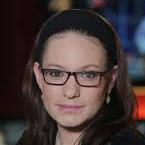

BY SIVAN RAHAV-MEIR
BY SIVAN RAHAV-MEIR
“Shalom, Sivan. My name is Noa Nechteiler and I would like to share a story with an important message for everyone:
Exactly one year ago today, on the ninth of Sivan, 21-year-old Eliyahu Moshe Zimbalist was killed in Gaza. He had made aliyah with his family from Silver Spring, Maryland, lived in Beit Shemesh, and studied at Yeshivat Shaalvim.
Much excitement has surrounded Emunah Cohen and Neta Lax, the two fresh winners of the annual International Bible Quiz. Yesterday I interviewed them and heard their story.
Much excitement has surrounded Emunah Cohen and Neta Lax, the two fresh winners of the annual International Bible Quiz. Yesterday I interviewed them and heard their story.
I went with a good friend to comfort his family during the shiva. We left inspired by the faith and nobility of these precious people. On the way home, we couldn’t stop thinking - we felt that we needed to do something to continue to spread Eli Moshe’s light in the world.
It turns out that they studied long hours together and were confident they would be the leading competitors. "We planned on winning together," Emunah revealed. "We thought both of us would answer every question correctly so that we would both be champions, tied for first place.
It turns out that they studied long hours together and were confident they would be the leading competitors. "We planned on winning together," Emunah revealed. "We thought both of us would answer every question correctly so that we would both be champions, tied for first place.
But in the end Emunah won. "They made a big deal about our big hug after I lost," Neta said. "But it was the easiest thing to share in her happiness. Besides, we were just relieved that the competition was finally over."
the first time?' Yet I simply forgot it. I thought afterwards that HaShem caused me to forget the answer in order to remind me that I do not know everything, that I am human and not perfect."
the first time?' Yet I simply forgot it. I thought afterwards that HaShem caused me to forget the answer in order to remind me that I do not know everything, that I am human and not perfect."
would be taking place on the ninth of Sivan, exactly one year after this tragedy, in Eli Moshe’s merit.
"The more you learn," Neta said, "the easier it gets. When you learn a lot of Tanach (Bible) you simply see how everything connects to your life. I truly felt that what I learned accompanied me wherever I went. It made my heart feel good."
"The more you learn," Neta said, "the easier it gets. When you learn a lot of Tanach (Bible) you simply see how everything connects to your life. I truly felt that what I learned accompanied me wherever I went. It made my heart feel good."
Mazal tov, Yehuda and Hodaya. May all of us be blessed with good news.
I’m also writing this note to encourage everyone to think of different ways in which they too can fill the vacuum left behind in the Jewish people”.
In closing, Neta declared: "The two of us will continue to study the Tanach. There were parts of the Tanach that were not in the material covered by the quiz, and it's import ant for us to learn them too."
In closing, Neta declared: "The two of us will continue to study the Tanach. There were parts of the Tanach that were not in the
And Emunah had this recommendation: "Study the Bible for 5 minutes every day Not for school, not for the Bible quiz, but just for how much fun it will be."
But in the end Emunah won. "They made a big deal about our big hug after I lost," Neta said. "But it was the easiest thing to share in her happiness. Besides, we were just relieved that the competition was finally over."
In the course of the entire contest, Emunah made only one error. "I knew the answer to the question: 'When did King David cry for
In the course of the entire contest, Emunah made only one error. "I knew the answer to the question: 'When did King David cry for
And then we arrived at a simple and profound idea: we would try to make a shidduch (match) between people we knew. We started to think of names and to share different ideas. We spoke about my cousin and my friend came up with a brilliant suggestion for her. Suddenly, everything seemed to come together. I reached out to this young man, who was then serving in Gaza. He replied that he didn’t think it was a suitable time for him. But several months later he got back to me and asked if the girl we had in mind for him was still available…
NETANYA 4 ROOM APT. RENTAL, Nitza Blvd, 1 month min. Amazing sea view, kosher, furnished: May, June, July 2023 from September 2023 short or long term APTNETANYA@GMAIL.COM
NETANYA 4 ROOM APT. RENTAL, Nitza Blvd, 1 month min. Amazing sea view, kosher, furnished: May, June, July 2023 from September 2023 short or long term APTNETANYA@GMAIL.COM
Flash forward to last Thursday. We were making our way to this couple’s wedding when it suddenly occurred to us that the wedding
And Emunah had this recommendation:
.
Not for school, not for the Bible quiz, but just

media. She was voted by Globes newspaper as most popular female media personality in Israel and by the Jerusalem Post as one of the 50 most influential Jews in the world.
media. She was voted by Globes newspaper as most popular female media personality in Israel and by the Jerusalem Post as one of the 50 most influential Jews in the world.
Sivan Rahav-Meir is a media personality and lecturer. Married to Yedidya, the mother of five. Lives in Jerusalem, and formerly served as the World Mizrachi Shlicha to North America. Sivan lectures in Israel and overseas about the media, Judaism, Zionism and new media. She was voted by Globes newspaper as most popular female media personality in Israel and by the Jerusalem Post as one of the 50 most influential Jews in the world.


8-WEEK WOMEN’S BEIT MIDRASH SHIUR
TUESDAYS - “TOWARDS MEANINGFUL TEFILLA” WITH MRS. ZEMIRA OZAROWSKI
Sponsored by Carole Goldberg for the neshama of her mother Malka Sheva bat Yitzhok a”h
RABBI TAUB’S SHIUR
Sponsored for the academic year by the Legacy Heritage Fund
RABBI BREITOWITZ’S SHIUR
Dedicated anonymously for the refuah shleima of Oksana bat Bluma and Evelina bat Galina
RABBI MANNING’S SHIUR
Sponsored for the 2025 academic year תמשנ


RABBI GOLDSCHEIDER’S SHIUR
Sponsored for the 2025 academic year תמשנ וליעל
RABBI ADLER’S SHIUR
Sponsored for this academic year by the Frist family in memory of their beloved daughter and sister Elisheva Frist a”h
RABBI SHAI FINKELSTEIN’S SHIUR
Sponsored for the 2024-2025 academic year by the Sondhelm and Wertenteil Families in memory of Mel & Sylvia David z”l
TO SPONSOR A SHIUR CONTACT
Chana Spivack - 050-229-4951 or donate online: https:// www.ouisrael.org/donate/ou-israel-center/

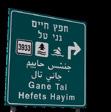



Tzitzit tying with Ruti Beit Knesset HaNassi, 24 Ussishkin
1:15-4pm Wednesdays 12-3pm









SUNDAY, JUNE 29, 2025
17:30-20:30
NEFESH B’NEFESH ALIYAH CAMPUS
SDEROT YITZHAK RABIN 10, JERUSALEM












Join us to get all the information you need about your upcoming Aliyah!
June, 2025 | Online
Celebrating the thousands of Olim who are making Aliyah this summer!
May-September, 2025 | nbn.org.il/flights
The Jewish Agency for Israel Presents:

Are you a doctoror medical student thinking of Aliyah? Join us to discuss what Aliyah can look like for you!
Australia: July 27, Melbourne | July 29, Sydney
Join us for a conference packed with dynamic, tailor-made sessions to help you optimize your finances.
Sunday, June 15, 2025 | 9:45am-16:00pm | NBN Aliyah Campus JLM
Join us for a fair featuring a wide variety of books written by Olim authors!
Sunday, June 29, 2025 | 17:30-20:30 | NBN Aliyah Campus JLM
Our dedicated NBN staff offer one-on-one assistance to help you navigate and understand any challenging Hebrew task.
Tuesdays, NBN Aliyah Campus JLM | Thursday, NBN TLV Center
www.nbn.org.il/all-events







OU ISRAEL FACULTY

Mizmorim 120-134 comprise a unit, each titled “Shir Hama’alot”, 1 a Song of Ascent. Rashi teaches that these fifteen psalms were sung by the Leviim as they stood upon the fifteen steps leading from the Ezrat Nashim up to the Ezrat Yisrael in the Beit Hamikdash, at the Simchat Beit HaShoeva on Sukkot.
Interestingly, the Mishnah refers to these steps twice, employing different terminology on each occasion. In masechet Sukkah, describing the Simchat Beit HaShoeva, the Mishnah speaks of the steps descending from the Ezrat Yisrael to the Ezrat Nashim. In masechet Middot, describing the physical space of the Mikdash, the Mishnah speaks of 1. The exception is Psalm 121, titled “Shir LaMa’alot”.

the steps ascending from the Ezrat Nashim to the Ezrat Yisrael. While this anomaly is easily explained by referring to the context in which each mishnah is found, which references the stairs in relation to the area under discussion, it is nevertheless noteworthy. Just as every set of stairs leads both up and down, life is filled with ascents and descents.
The Navi Michah taught: יתביא
- Do not rejoice [over my downfall], my enemies, for though I have fallen I will rise; though I sit in darkness Hashem is my light.2 The word יכֵּ in this verse is interpreted literally as “though”; the midrash interprets it more familiarly, as “because” - Because I have fallen, I will rise. It is precisely in the darkest hours of history that light shines most brightly. The midrash offers as examples the miracles of Yetziat Mitzrayim and of Purim, and the salvation of Hananiah, Mishael and Azaryah.3
It is no accident that there are both fifteen psalms and fifteen steps to demonstrate this idea. The number fifteen is implicit in Creation as one that represents the midpoint between ascent and descent, reflected in the phases of the moon. The Maharal teaches that the number fifteen is the numerical value of the Divine Name (ה-י), with which Hashem created the world, both temporal and eternal. It is for this reason that spiritual ascent is represented by the number fifteen, 2. Michah 7:9
3. Midrash Tehillim 22
through which the full potential state of the world was actualized. We further express our appreciation for the world which Hashem created by singing the fifteen verses of “Dayenu” on Pesach (which falls on the fifteenth day of the month), culminating with the building of the Beit HaMikdash, where our relationship with Hashem reaches its fullest expression.4
The destruction of the Beit HaMikdash precipitated a period of decline in Jewish history. The phases of the moon, to which the Jewish people are compared, teach us that this decline is part of the process of redemption - descent in order to allow for spiritual growth and rejuvenation. Rav Yaakov Yosef of Polonye teaches that just as this is so for the nation, it is equally true of every individual within the nation. One should never despair if he falls in his spiritual development; rather, he should view it as an opportunity for renewed growth and vigor in his relationship with Hashem.5 As we study the fifteen songs of ascent, may we be inspired to strive a little higher each and every day in our Avodat Hashem.
4. Gevurot Hashem 59
5. Toldot Yaakov Yosef Parashat Naso
Mrs. Leah Feinberg is a master educator who taught at the SKA High School for Girls in Hewlett for twenty-one years, also serving as Tanach Department chairperson and New Teacher Mentor. Leah is currently on the faculty of the OU Israel Center and has taught in all three cycles of the OU Women’s Initiative Nach Yomi program
In the OU Women’s Initiative Nach Yomi series, currently in its third cycle, women scholars deliver a daily shiur on the books of Prophets (Neviim) and Writings (Ketuvim) at the pace of a chapter a day. Shiurim are geared toward learners of all levels who would like to participate in the twoyear Nach Yomi study cycle. Visit the OU Women’s Initiative to register for additional content.
Struggling to find the right apartment in Jerusalem?

Whether you’re in Israel or abroad, I’ll assist you in finding a home that truly fits – location, size and budget.
Local knowledge !
Professional service!
Real results ! Nahum Glatzer 050-7225694






RABBI YOSEF GINSBERG REGIONAL DIRECTOR, NCSY ISRAEL
In this week’s parsha, Aharon HaKohen is commanded to light the Menorah: “...תֹרנה תא ךְתלעהב" – “When you raise up the flames…” (Bamidbar 8:2).
Rashi notes that it doesn’t just say “light” the candles, it says “raise” them. Why? Because the job isn’t finished until the flame can rise on its own. Real leadership isn’t about making sparks, it’s about building fires that keep burning, even when you’re not there.
This is something we live by at NCSY Israel. As teens grow in Torah, connection to the land, and personal leadership, our goal is not to impress them — it’s to empower them. To help them find that internal flame that keeps glowing even when the Shabbaton ends or the bus ride is over.
The Sfas Emes (Beha’alotcha, 5650) explains that each Jew’s soul is a hidden light — the role of the Menorah, and of the mentor, is to reveal that light. Similarly, Rav Kook writes

in Orot HaTeshuva (ch. 5) that true growth comes not from external pressure, but from “the inner demand of the soul to return to its source.”
Teens don’t need more lectures. They need people who believe in them, who remind them they already have the fire, they just have to raise it.
So here’s the question: Are you waiting for someone else to light your spark, or are you ready to raise your own flame?
Let’s keep building a generation that doesn’t burn out… but lights up the world.
Parashas Behaalotekha is a very eventful parashah, from Aharon being commanded to light the menorah, to the Leviim being included in the service of the Sanctuary, the introduction of a second Passover, and Miriam’s lashon hara leading to leprosy. Long story short, this parashah has it all. But in my opinion, the real climax is the growth we see from our leader, Moshe.
Although Moshe seems to be on a completely different level than us, in Behaalotekha we see him as a human, one of us. He has led the Jewish people through so much. What more could be asked of him? And yet, the people are still not satisfied. Am Yisrael is fed, protected, and has no real
worries. All they need to do is enjoy Hashem’s blessings and learn Torah from Moshe Rabbeinu. Sounds like paradise, no?
Well, not to them. They’re missing one thing they believe will make them content: meat. Seriously? That’s what they’re missing? That’s how Moshe reacts, and rightfully so. He says:
“You have laid the burden of all this people upon me? … Where can I get meat for all these people? … The burden is too heavy for me” (Num. 11:11–14).
After all he’s already done, Moshe seems to reach a breaking point. As Rabbi Sacks explains in Essays on Ethics, he can’t go on alone, not because he can’t ask God to provide meat, but because he yearns to end his isolation. He wants support. As a solution, Hashem commands Moshe to appoint seventy elders to help lead the people, and that lifts his despair.
Often, we take too much upon ourselves, and it can feel like we’re drowning, not just in work, but in loneliness. We must learn from Moshe Rabbeinu: surround yourself with great people, whether friends, family, or teachers. It’s important to remember: you are never alone.
And at the end of the day, you can always turn to Hashem. He will always give you what you need — not always what you want — just as He gave Moshe support instead of simply providing meat for the people.
Shabbat Shalom.



Stunning Penthouse in Arnona
Sold


Breathtaking Views
Wheelchair Accessible
Price: Upon request




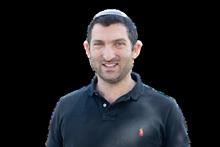
Finally Ready To Think About Israel BUT Not Sure About Where or How To Buy? Contact Me For A Free Zoom Consult
Netanya- Close To Ir Yamim - Limited Time Offer - LAST APTS
Select 2, 3, 4, Bedroom Apartments Completing June 2027
Great Pricing with NO INDEX + ONLY 10% At Closing
Builder Offering 1M NIS mortgage - 20 years - 2.49%
Balance + 1st mortgage payment at Keys
PENTHOUSE - CALL FOR SPECIAL PRICING BY MAY 31.
Jerusalem: PRE-SALE
Talpiot New - 3 Bedrooms - 3.58M NIS
Arnona New - 4 Bedrooms - 4.7M NIS*
Mekor Chaim - Luxury Apts - From 3.6M NIS*
Haifa : New Project - PRE-PRE SALE Close To Beach / Sea
New - 2 Bedrooms - Starting From 2.2M NIS / $597K USD
New - 3 Bedrooms - Starting From 2.64M NIS / $716K USD
New - 4 Bedrooms - Starting From 3.0M NIS / $814K USD
Rehovot:
4 Bedrooms - Close to Berman Shul - 3.2M NIS
4 Bedrooms + Roof rights - Near Berman & Weizmann - 2.8M



We Offer Free Home Inspections**
EFRAT - NEW APARTMENTS - PROJECT IN ZAYIT90 sqm - 2M NIS, 110 sqm - 2.3M NIS, 130 sqm - 2.5M NIS
North Netanya Next To Young Israel - 4 bedrooms - Must See 4.1M NIS
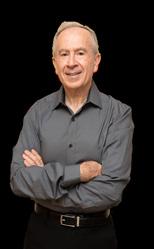
Hadera Land - 125sqm - 395k NIS , 2 Plots for 380k NIS
First Line To See - Resale - 3 Bedrooms - 3.4M NIS
Tel Aviv : NEW
Ben Yehuda St. - 3 Bedrooms From 5.9M NIS*
Yarkon Park - 2 Bedrooms From 4.99M NIS*
Jabotinsky St - 3 Bedrooms - From 4 99M NIS*
Nahariya:
4 Bedrooms - New Project - From 1.92M NIS*
Nahariya : Boutique Building - Quiet Street - Close To Sea 100 meters to Beach - Finishing in 1 year
4 Bedrooms - 2.95M NIS / $800k USD
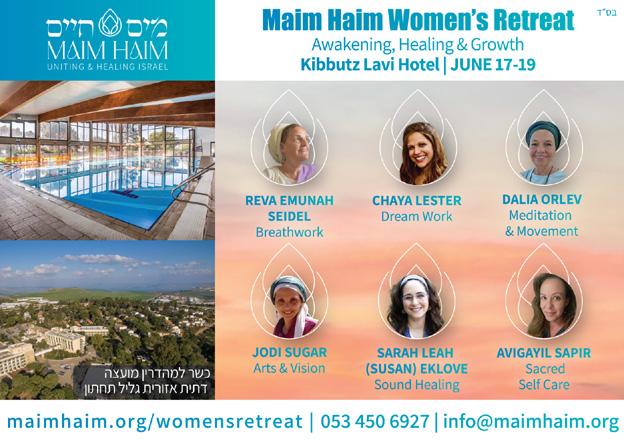


www.angelrealty.co.il
For Sale in Efrat
Zayit: * 200m cottage, next to Shirat David. 6,500,000 NIS
Zayit: * 3 room apt. next to the mall. 2,100,000 NIS
Zayit: * 3 room apt. Stunning view. Next to Shirat David . 2.170.000 NIS
Zayit: * 6 room,170m penthouse. 3.550.000 NIS
Te'ena: * 5.5 room apt. 170m on one level, level -1 3,400,000 NIS
Dekel: 5 room apt. 150m. +50 m. floor. rd , 3 pergola balcony with 2.950.000 NIS Gabi- 0524588716








